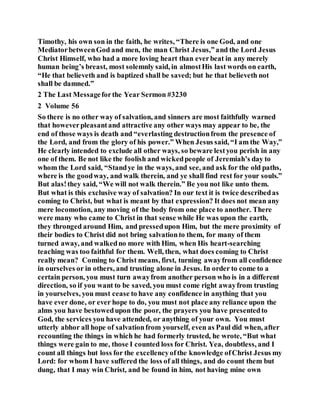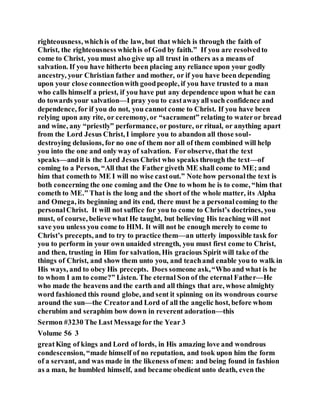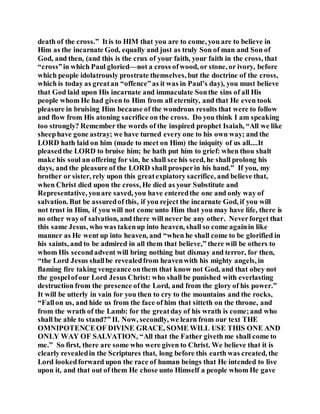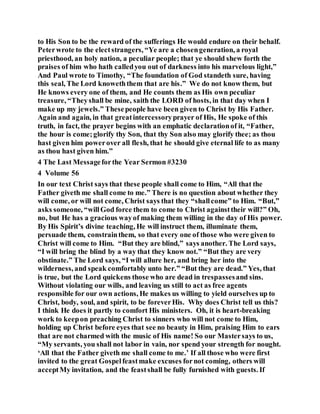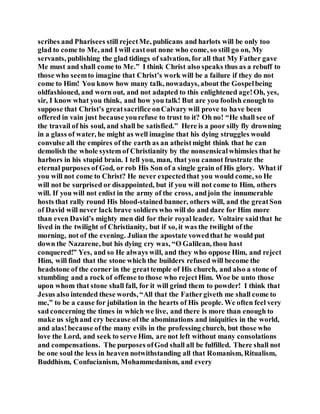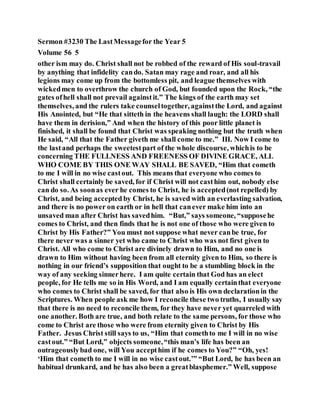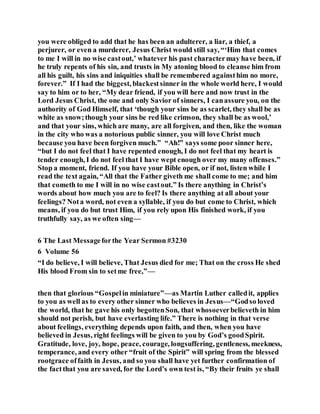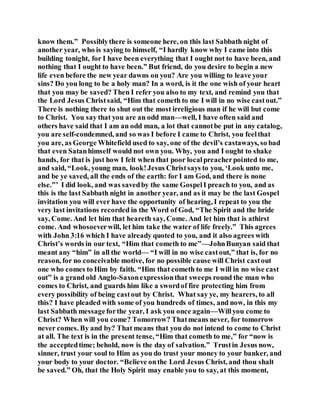The document discusses the importance of coming to Christ for salvation, emphasizing that anyone who approaches Him will not be turned away, regardless of their background or sins. It highlights the necessity of leaving behind other forms of trust and accepting Jesus as both Savior and Lord. Ultimately, it assures that all who come to Christ, with true faith, will be welcomed and saved.

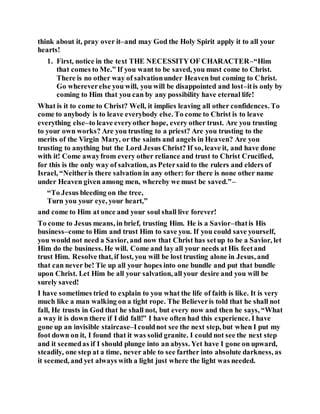
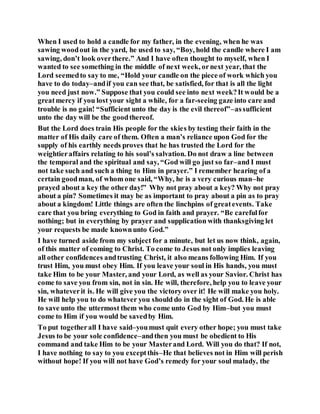

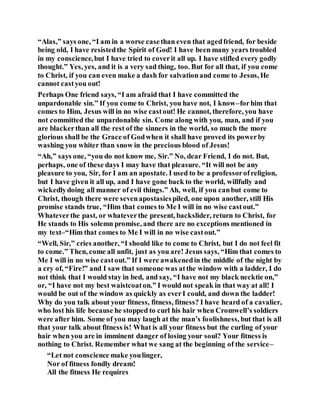
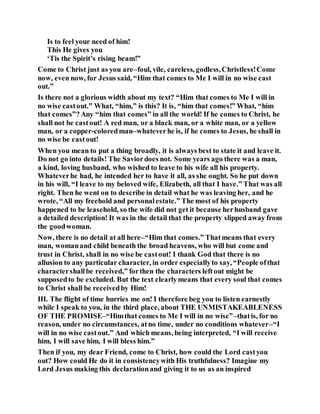
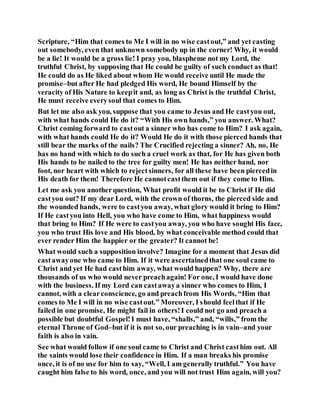
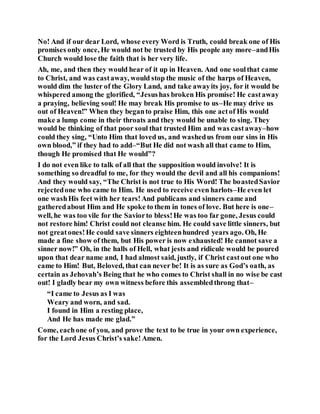
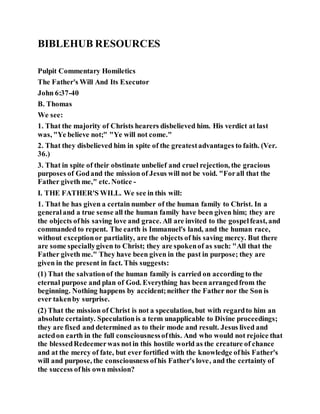
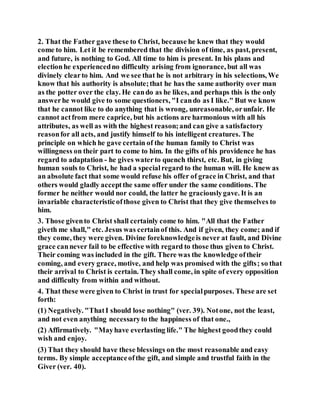
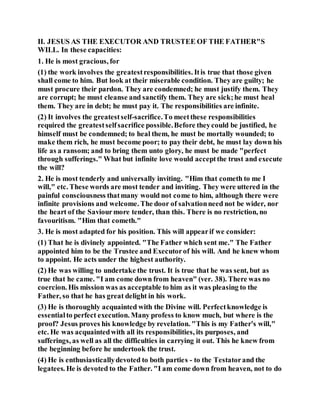
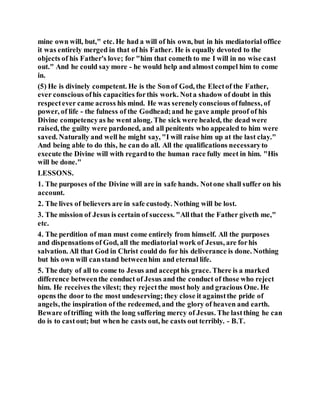
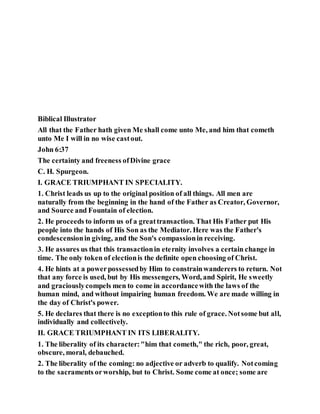
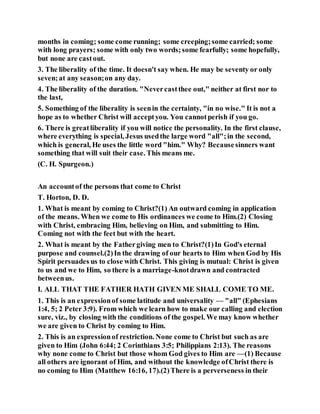
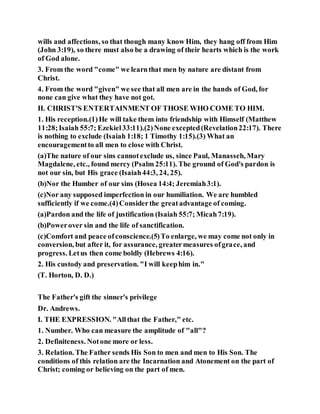
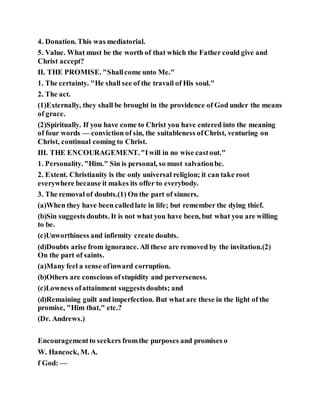
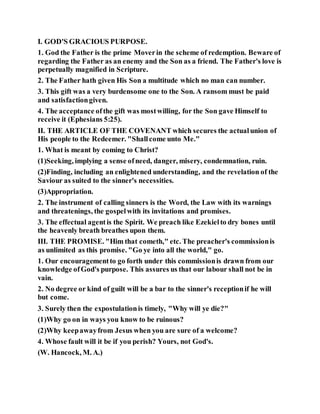
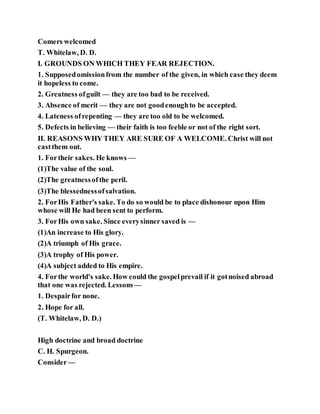
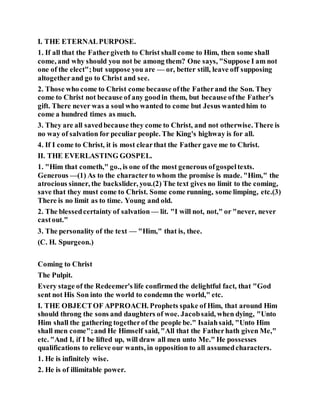
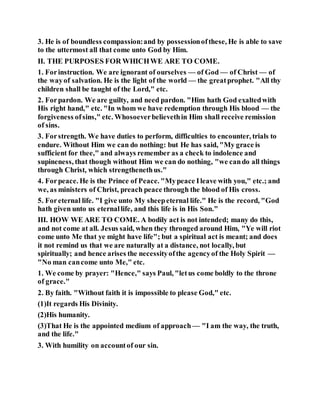
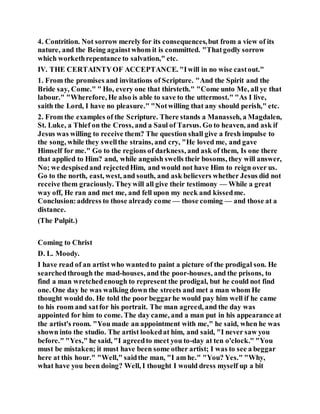
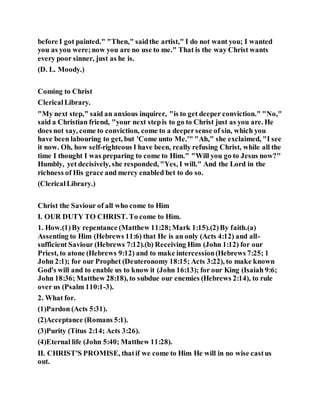
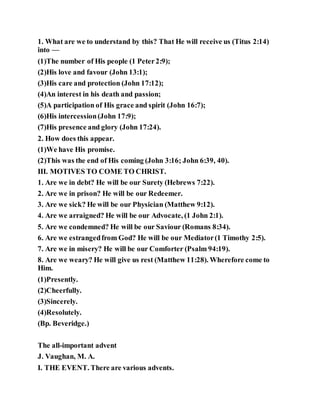
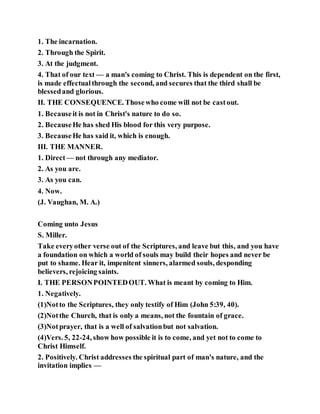
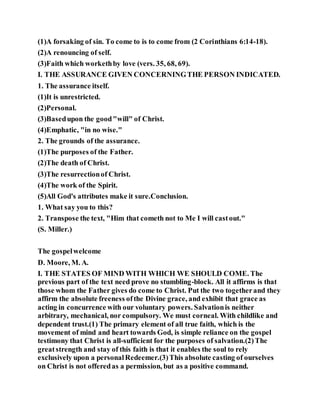
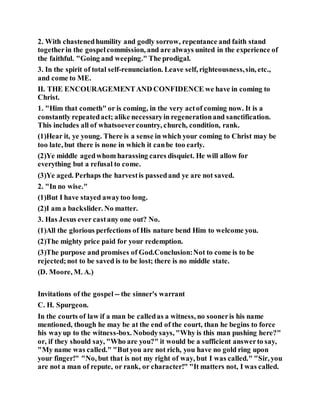
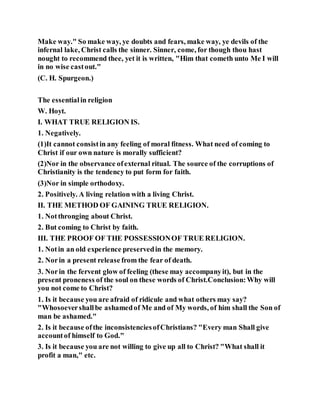
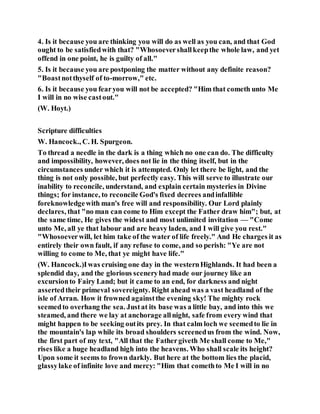
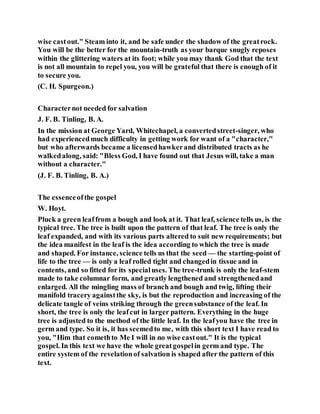
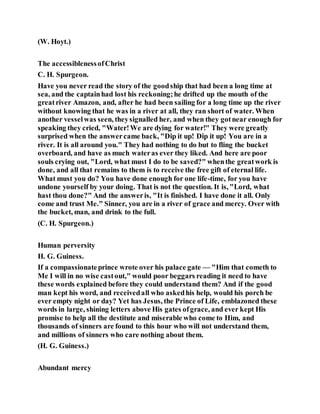
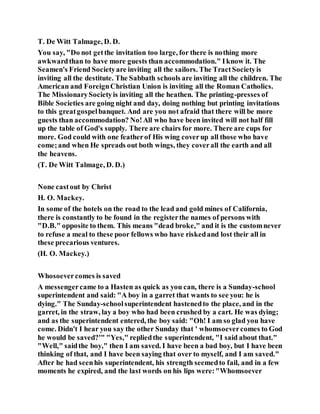
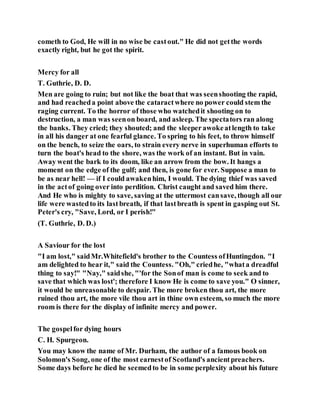
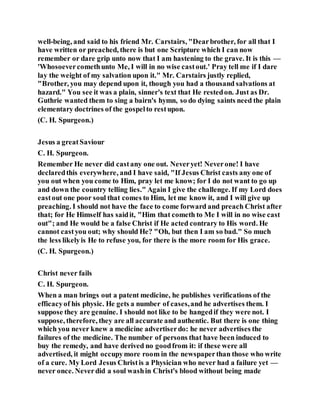
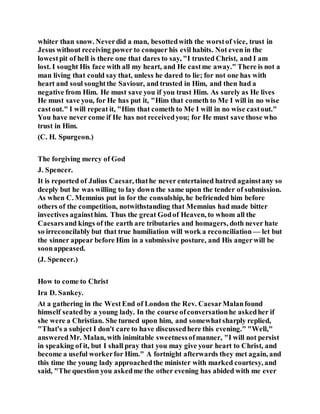
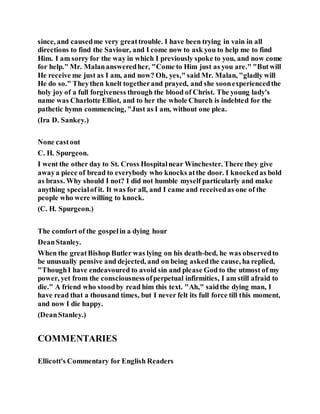
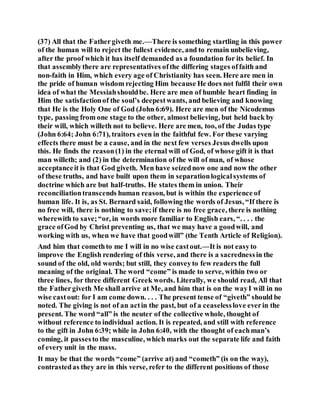
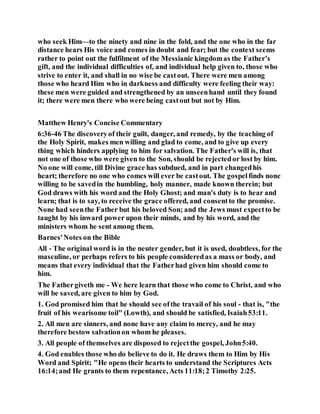
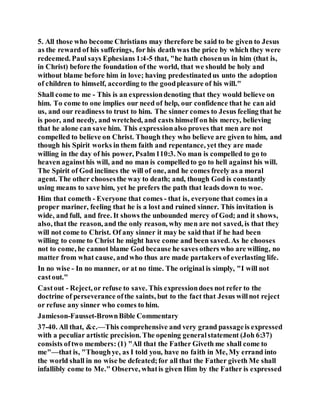
![in the singular number and neuter gender—literally, "everything"; while
those who come to Him are put in the masculine gender and singular
number—"every one." The whole mass, so to speak, is gifted by the Father to
the Sonas a unity, which the Son evolves, one by one, in the executionof His
trust. So Joh 17:2, "that He should give eternallife to all that which Thou hast
given Him" [Bengel]. This "shall" expresses the glorious certainty of it, the
Father being pledged to see to it that the gift be no empty mockery. (2) "And
him that comethto me I WILL IN NO WISE CAST OUT." As the former was
the divine, this is just the human side of the same thing. True, the "coming"
ones of the secondclause are just the "given" ones of the first. But had our
Lord merely said, "When those that have been given Me of My Fathershall
come to Me, I will receive them"—besides being very flat, the impression
conveyedwould have been quite different, sounding as if there were no other
laws in operation, in the movement of sinners to Christ, but such as are wholly
divine and inscrutable to us; whereas, thoughHe does speak ofit as a sublime
certainty which men's refusals cannot frustrate, He speaks ofthat certainty as
taking effectonly by men's voluntary advances to Him and acceptanceof
Him—"Him that cometh to Me," "whosoeverwill," throwing the door wide
open. Only it is not the simply willing, but the actually coming, whom He will
not castout; for the word here employed usually denotes arrival, as
distinguished from the ordinary word, which rather expresses the act of
coming (see Joh8:42, Greek), [Websterand Wilkinson]. "In no wise" is an
emphatic negative, to meet the fears of the timid (as in Re 21:27, to meet the
presumption of the hardened). These, then, being the two members of the
generalopening statement, what follows is meant to take in both,
Matthew Poole's Commentary
Here ariseth a greatquestion amongstinterpreters of various persuasions,
what giving of the Father is here meant; whether an eternal designationof
persons to eternal life, in order to the obtaining of which the persons so
predestinated are given to Christ, as he who was to be the Messiah, Saviour,
and Redeemerof the world; or the infusing the habits of special, saving grace,
by which persons are enabled actually to believe. If the former, the words do
not only infer an infallible connexion betwixt faith and eternal life and
salvation;but also betwixt the decree of electionand the collationof special
grace, by which men are enabled to believe, and, believing, are saved. That
which seemethto favour the latter opinion is, that the verb is in the present
tense;it is not, all that the Fatherhath given, but](https://image.slidesharecdn.com/jesuswasawelcomer-200320144616/85/Jesus-was-a-welcomer-39-320.jpg)
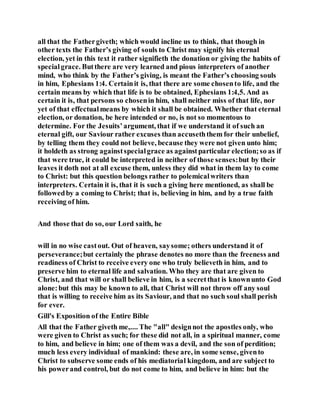
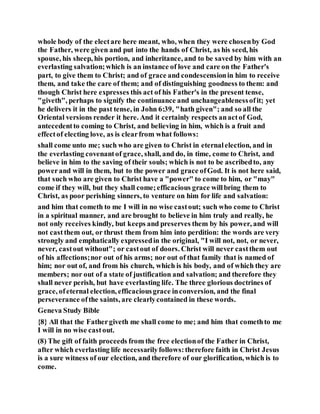
![EXEGETICAL(ORIGINAL LANGUAGES)
Meyer's NT Commentary
John 6:37 ff. Through this culpable οὐ πιστεύετε, they were quite different
from those whom the Father gave Him. How entirely different were all these
latter; and how blessedthrough me, according to the Father’s will, must their
lot be!
πᾶν] Neuter, of persons as in John 3:6, John 18:2; 1 Corinthians 1:27. It
designates them as a “totam, quasi massam,” Bengel.
ὁ δίδ. μοι ὁ πατ.] viz. by the efficacious influence of His grace (John6:44-45),
whereby He inclines them to come, and draws them to me; οὐ τὸ τυχὸν
πρᾶγμα ἡ πίστις ἡ εἰς ἐμέ. ἀλλὰ τῆς ἄνωθεν δεῖται ῥοπῆς, Chrysostom. Moral
self-determination (John 5:40, John 7:17; Matthew 23:37) may obey this
influence (John 6:40), and may withstand it; he who withstands it is not given
Him by the Father, Php 2:13. “There is implied here a humble, simple,
hungering and thirsting soul,” Luther. Explanations resting on dogmatic
preconceptions are:of the absolute electionof grace (Augustine, Beza, and
most others[233]), ofthe natural pietatis studium (Grotius), and others.
πρὸς ἐμέ] afterwards ΠΡΌς ΜΕ. But ἘΜΈ is emphatic. The ἭΞΕΙis not
more (arrivera jusqu’à moi, Godet)than ἐλεύσεται, as John 6:35 already
shows;comp. the following Κ. Τ. ἘΡΧΌΜΕΝΟΝ, withwhich ἭΞΩ is again
resumed.
Οὐ ΜῊ ἘΚΒΆΛΩ ἜΞΩ] I certainly will not casthim out, i.e. will not
exclude him from my kingdom on its establishment; comp. John 6:39-40;
John 15:6; also Matthew 8:12; Matthew 22:13. The negative expressionis a
litotes full of love; Nonnus adds: ἀλλὰ νόῳ χαίροντι δεδέξομαι.
John 6:38-39. “How could I castthem out, seeing that I am come only to fulfil
the divine will? and this requires of me, not the rejectionof any one, but the
blessedopposite.”
οὐχ ἵνα, κ.τ.λ.]Comp. John 5:30.](https://image.slidesharecdn.com/jesuswasawelcomer-200320144616/85/Jesus-was-a-welcomer-42-320.jpg)
![ΤΟῦΤΟ ΔῈ … ΠΈΜΨ. ΜΕ] impressive repetition of the same words.
ΠᾶΝ Ὁ ΔΈΔΩΚΕ, Κ.Τ.Λ.]Nominative absolute, unconnectedwith the
following, and significantly put first. Comp. John 8:38, John 15:2, John 17:2;
and see on Matthew 7:24; Matthew 10:14; Matthew 10:32;Matthew 12:36;
Buttmann, N. T. Gr. p. 325 [E. T. p. 379]. Here the Perfectδέδωκε, because
spokenfrom the standing-point of the future.
μὴ ἀπολ. ἐξ αὐτοῦ]sc. τι; see Fritzsche, Conject. p. 36. The conceptionof
losing (i.e. of letting fall down to eternal death; see the antithesis ἀλλὰ, etc.)is
correlative to that of the ΔΈΔΩΚΈ ΜΟΙ. Comp. John 17:12.
ἈΝΑΣΤΉΣΩ, Κ.Τ.Λ.]of the actualresurrectionat the last day (comp. John
5:29, John 11:24, John 12:48), which, as a matter of course, includes the
transformation of those still living. The designationof the thing is a potiori. It
is the first resurrectionthat is meant (see on Luke 14:14; Luke 20:34; Php
3:11; 1 Corinthians 15:23), that to the everlasting life of the Messianic
kingdom. See on John 5:29. Bengelwellsays:“hic finis est, ultra quem
periculum nullum.” Comp. the recurrence of this blessedrefrain, John 6:40;
John 6:44; John 6:54, which, in the face of this solemnrecurrence, Scholten
regards as a gloss.
[233]See, on the contrary, Weiss, Lehrbegr. p. 142 ff.—Schleiermacher
rationalizes the divine gift and drawing into a divine arrangementof
circumstances;see L. J. p. 302 ff. Thus it would be resolvedinto the general
government of the world.—According to Beyschlag,p. 162, there would be in
this actionof the Father, preparing the way for a cleaving to Christ (comp. vv.
44, 45), an oppositionto the light-giving action of the Logos (vv. 4, 5, 9), if the
Logos be a personality identical with the Son. But the difference in person
betweenthe Fatherand the Sondoes not exclude the harmonious action of
both for eachother. Enlightening is not a monopoly of the Son, excluding the
Father; but the Father draws men to the Son, and the Sonis the way to the
Father. Weiss has rightly rejectedas unjohannean (p. 248 f.) the idea of a
hidden God, as absolutelyraised above the world, who has no immediate
connectionwith the finite.
Expositor's Greek Testament](https://image.slidesharecdn.com/jesuswasawelcomer-200320144616/85/Jesus-was-a-welcomer-43-320.jpg)
![John 6:37. No;for πᾶν ὃ δίδωσι … ἥξει. “Everything which the Fathergives”;
the neuter is used as being more universal than the masculine and including
everything which the Fatherdetermines to save from the world’s wreck,
viewed as a totality. Cf. John 6:39. ἀναστήσω αὐτό:and the collective neuter,
as in Thucyd., iii. 16, τὸ ἐπιόν for τοὺς ἐπιόντας. Lampe thinks the neuter is
used, “quia hae personae spectanturut reale peculium, haereditas, merces,
genus, semen, sacerdotium, sanctuarium Domini”. What is meant by δίδωσι?
It is an acton God’s part prior to the “coming” on man’s part; the coming is
the result of the giving. Calvinistic interpreters have therefore identified the
giving with election. “Donandiverbum perinde valet ac si dixisset Christus,
quos elegitPater, eos regenerat”—Calvin. “Patremdare filio esteligere”—
Melanchthon; and similarly Beza and Lampe. On the other hand, Reynolds
represents a number of interpreters when he says, “It is the present activity of
the Father’s grace that is meant, not a foregone conclusion”. This identifies
the Father’s “giving” with His “drawing,” John 6:44. It would rather seemto
be that which determines the drawing, the assigning to Jesus ofcertain
persons who shall form His kingdom. This perhaps involves electionbut is not
identical with it. Cf. John 17:6. Euthymius replies, from a Semi-Pelagianpoint
of view, to the objections which arise from an Augustinian interpretation of
the words. The purpose of the verse is to impart assurance that Christ’s work
will not fail. καὶ τὸν ἐρχόμενον… ἔξω. Grotius thinks the “casting out” refers
to the Schoolof Christ; Lücke thinks the kingdom is referred to. It is scarcely
necessaryto think of anything more than Christ’s presence or fellowship. This
strong asseverationοὐ μὴ ἐκβάλω, and concentratedGospelwhichhas
brought hope to so many, is here grounded on the will of the Father.
Cambridge Bible for Schools and Colleges
37–40.Digressiononthe blessednessofthose who come to Christ as believers
37. All that the Father giveth … him that cometh] There is a significant
change of gender in the Greek which is obscured in the English version: ‘all
that’ is neuter, all that which; what is given is treatedas impersonal, mankind
en masse;what comes, with free will, is masculine. Men are given to Christ
without their wills being consulted; but eachindividual can, if he likes, refuse
to come. There is no coercion. Comp. similar changes of genderin John 1:11,
John 17:2.
shall come to me, and him that cometh … For I came down] The verb ‘come’
here represents three different Greek verbs, but there is no such great](https://image.slidesharecdn.com/jesuswasawelcomer-200320144616/85/Jesus-was-a-welcomer-44-320.jpg)
![difference betweenthem as to make it worth while to change so familiar a
text; yet it would be more literal to translate all that the Father giveth Me, to
Me shall come, and him that approachethMe I will in no wise castout; for I
have descended, &c. The second‘Me’ is emphatic, the first and third are not.
Bengel's Gnomen
John 6:37. Πᾶν) all. A most weighty word, and, in comparing with it those
things which follow, most worthy of consideration;for, in the discourses of
Jesus Christ, what the Father hath given to the SonHimself, that is termed,
both in the singular number and neuter gender, all [omne]: those who come to
the SonHimself, are describedin the masculine gender, or even the plural
number, every one [omnis], or they [illi]. The Fatherhath given, as it were, the
whole mass, in order that all whom He hath given, may be a unity [unum]:
that whole the Son evolves individually [one by one], in the carrying out of the
Divine plan. Hence that expression, ch. John 17:2, that ALL which [πᾶν ὅ,
omne quod] THOU HAST GIVEN Him, HE SHOULD GIVE THEM [αὐτοῖς,
eis] eternallife. In the Greek style of the New Testament, especiallyof John,
wheresoeverfastidious minds would saythe constructionwas a solecism, an
elegancetruly divine, which to the Hebrews never seemedharsh, is usually
found to lie beneath. That remark especiallyholds goodof this passage. It is
owing to it that this 37th verse has two members, which are presently handled,
the same words being repeated; and indeed the former of the two, at John
6:38-39, where the all [πᾶν ὃ δέδωκε, omne, etc.] is mentioned in conjunction
with the Father;the secondmember, at John 6:40, “This is the will of Him
that sent Me, that every one which seeththe Son, and believeth on Him, may
have everlasting life;” where the every one [πᾶς, omnis] is mentioned in
conjunction with the Son. The former, by means of the ὅτι, for [John 6:38],
and the latter, by means of the γάρ, for [John 6:40 : δέ is the common reading;
but γάρ, [128][129][130][131][132][133][134]Vulg.], are connectedwith John
6:37.—δίδωσι μοί, giveth Me)by means of that drawing, John 6:44, “No man
can come unto Me, except the Father, which hath sent Me, draw him.” The
present tense. Afterwards the past, John 6:39, “This is the Father’s will,—that
of all which He hath given Me, I should lose nothing,” with reference to their
preservation. The Fathergiveth to the Son: the Son chooseth, i.e. gives as it
were to Himself; John 6:70, “Have I not chosenyou twelve?” Believers are
given; it is given to believers;John 6:32; John 6:65, “My Father giveth you the
true bread from heaven.—No man can come unto Me, except it were given
unto him of My Father.”—πρὸς ἐμέ)The emphasis rests on this; in other
places it is usually written πρός με.—ἥξει) shall come. It is only that all [which
the Fathergiveth Me]which shall come unto Me. Jesus speaksthose things,](https://image.slidesharecdn.com/jesuswasawelcomer-200320144616/85/Jesus-was-a-welcomer-45-320.jpg)
![which [such—as]if the Jews wouldreceive, they would be believers in reality:
and, after their unbelief has been brought home to them, He now offers them
faith: and what He had before spokenunder a figure, He now declares
plainly.—οὐ μὴ ἐκβάλω ἔξω, I will not castout) This signifies not merely the
first reception, but the lasting preservation, through all changes and
progressive steps in their course, even up to the resurrection—thatgoal,
which takes for granted all things anterior to it; John 6:39-40, “This is the
Father’s will, that—I should lose nothing, but raise it up again at the last
day;—that every one which seeththe Son, and believeth on Him, may have
everlasting life; and I will raise Him up, etc.;” John 6:44; John 6:54. There is
a Litotes [the meaning is strongerthan the literal words]: I will not casthim
out, but by all means will preserve him; ch. John 10:28, etc., “Theyshall never
perish, neither shall any pluck them out of My hand. My Father, which gave
them Me, is greaterthan all; and none is able to pluck them out of My
Father’s hand:” a passagewhichcloselycorresponds to the passagehere.
Comp. ἔξω, out, ch. John 15:6, “Castforth as a branch, and is withered;”
ἐβλήθη ἔξω.
[128]the Alexandrine MS.:in Brit. Museum: fifth century: publ. by Woide,
1786–1819:O. and N. Test. defective.
[129]Cod. Basilianus (not the B. Vaticanus): Revelation:in the Vatican:
edited by Tisch., who assigns it to the beginning of the eighth century.
[130]Ephræmi Rescriptus:Royallibr., Paris:fifth or sixth cent.:publ. by
Tisch. 1843:O. and N. T. def.
[131]Bezæ, or Cantabrig.: Univ. libr., Cambridge: fifth cent.:publ. by
Kipling, 1793:Gospels, Acts, and some Epp. def.
[132]Vercellensis ofthe old ‘Itala,’ or Latin Version before Jerome’s,
probably made in Africa, in the secondcentury: the Gospels.
[133]Veronensis, do.](https://image.slidesharecdn.com/jesuswasawelcomer-200320144616/85/Jesus-was-a-welcomer-46-320.jpg)
![[134]Colbertinus, do.
Pulpit Commentary
Verses 37-40. -
(b) Episode or, the blessednessofthose who "come" to Christ. Verse 37. -
Many suppose a time of stillness, a break in the conversation, "a significant
asyndeton," from the absence ofall connectionbetweenthis and the previous
verse. Vers. 39, 40 would seemto have been addressedmore directly to the
disciples, the less susceptible hearers retiring from him or engaging in eager
conversation(cf. ver. 41). Nevertheless, the Lord takes up the continuous line
of his self-revelation, and ver. 37 clearlyrefers the "non-coming" and "non-
believing" in their case to their moral obliquity, and to the apparent
inadequacy of sufficient proof to induce the faith which will satisfy spiritual
hunger. This spiritual dulness on the part of all suggestssome internal and
necessarycondition, which is, though yet absent, not said to be inaccessible.
Seeing ought to issue in believing, but it does not; therefore there is something
more than the manifestationof the Christ absolutelynecessary. To that Jesus
now reverts. All (πᾶν, the neuter is also usedof persons in John 3:6 and John
17:2, used concerning the whole body of realbelievers, the whole mass of
those who, when they see, do come - the entire company of believers regarded
as a grand unity, and stretching out into the future) all that which the Father
giveth me. The subsequent descriptions of the Father's grace (vers. 44, 45)
throw light on this. The "drawing of the Father," the "hearing and learning
from the Father," are there declaredto be conditions of "coming to Christ."
All those influences on the soul, all the new-creating and spirit-quickening
energies ofthe Holy Ghost, the new heart and tender conscience, the honest,
serious desire for holy things, are broadly described in this passageas God's
method and actof giving to the Sonof his love. There is no necessity(with
Augustine) to suppose that our Lord refers to an absolute predestinating
decree. Forif God has not yet given these particular men to him, it does not
say that he will not and may nut do so yet. The Father's giving to the Son may
indeed assume many forms. It may take the characterof original constitution,
of predisposition and temperamerit, or of special"providential educationand
training, or of tenderness of conscience, orof a truthful and sincere and
unquenched desire. The Father is the Divine Cause. "The giving" implies a
present activity of grace, nota foregone conclusion. All that which the Father
giveth me shall reachme - all souls touched by the Father in a thousand ways
to the point of making a moral surrender to my claims, will reachme - and
him that is coming to me - i.e. is on the way to me, is drawing near to me - I](https://image.slidesharecdn.com/jesuswasawelcomer-200320144616/85/Jesus-was-a-welcomer-47-320.jpg)
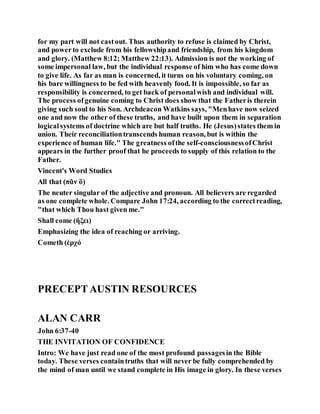
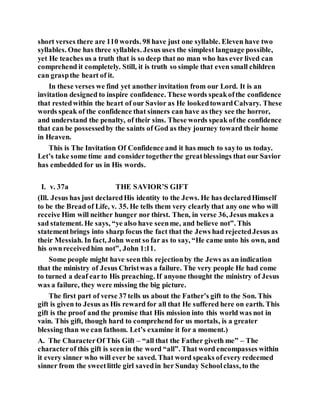
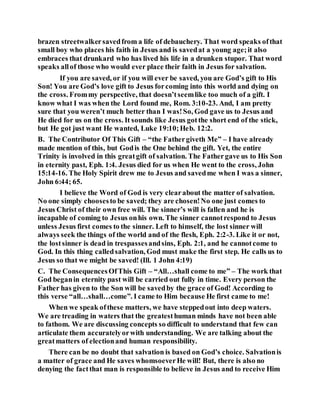
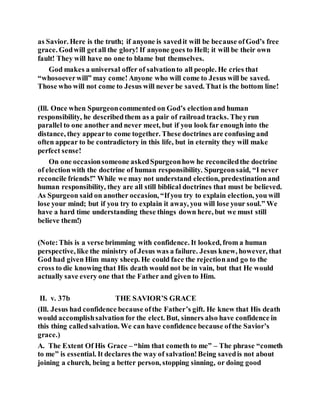
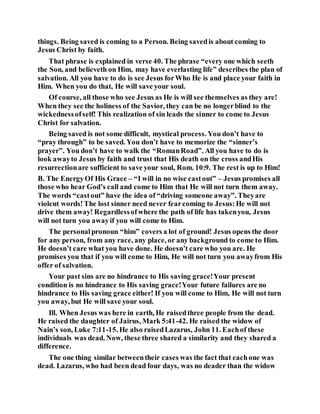
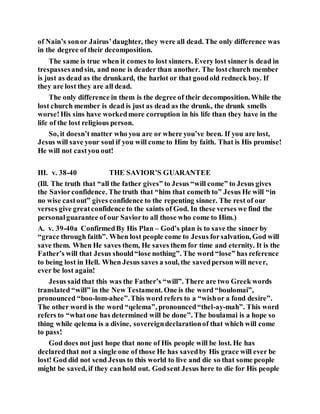
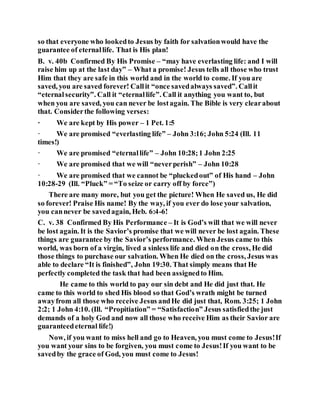
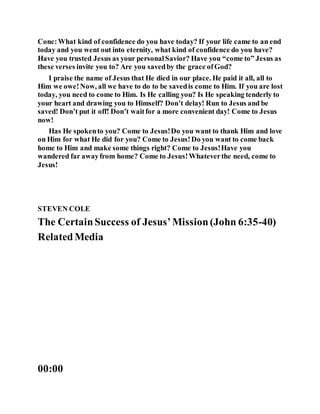
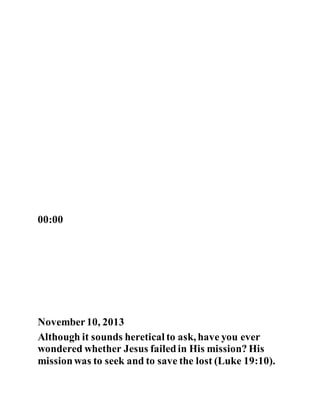
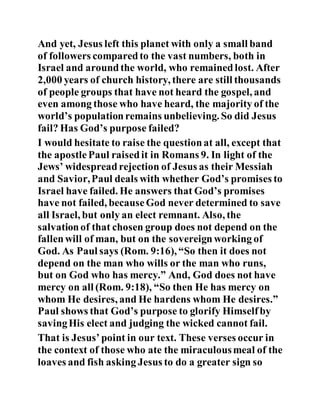
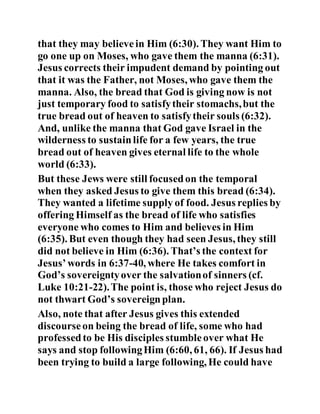
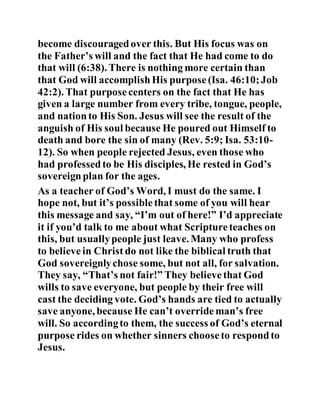
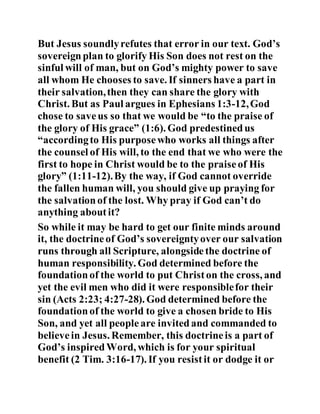
![try to explainit away, you’ll be spirituallyimpaired.
Even if you don’t understandit, you need to submit to
it (Rom. 9:19-20). Whileall Scripture is equally
inspiredby God, our text reports the very words of the
Lord Jesus. His point here is:
Jesus’missionto saveand keep all whom the Father
has given to Him will certainlysucceed.
Christoffers eternal life to all (6:35), but not all
believe(6:36). All those whom God has given to Jesus
will come to Him (6:37a). He will savethem and keep
them for all eternity (6:37b-40).
1. Christoffers Himselfas the livingbread that gives
eternal life to all who believein Him (6:35).
John 6:35:“Jesus said to them, ‘I am the bread of life;
he who comes to Me will not hunger, and he who
believes in Me will never thirst.” As Leon Morris
points out (The Gospel According to John [Eerdmans],
p. 366), Jesus’ words are not an abstractstatement,
but rather an appeal for people to come to Him and
believein Him. As I mentioned last week, this is an
astoundingclaim that no mere man could make. Jesus
says that if we will come to Him and believein Him,
He will eternally satisfyand sustainus spiritually.
It’s importantto affirm that the doctrine of election
does not in any way restrictoffering the gospel freely
to all. Whoeverbelieves in Jesus will have eternal life
(John 3:16). The Bible ends with this open invitation](https://image.slidesharecdn.com/jesuswasawelcomer-200320144616/85/Jesus-was-a-welcomer-61-320.jpg)
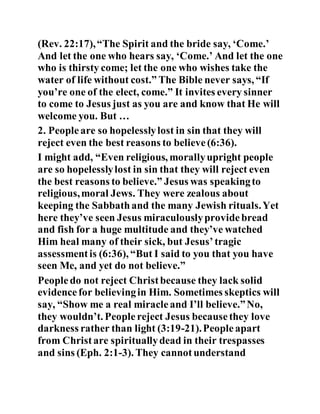
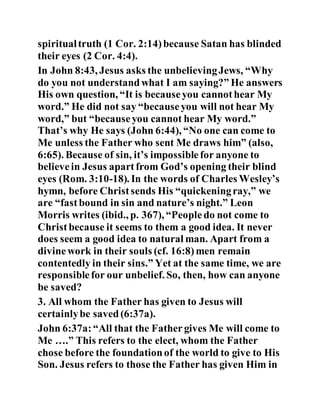
![6:39 and in 10:29 (see, 18:9). He repeats it five times in
His prayer in John 17:
John 17:2:“… even as You gave Him authorityover
all flesh, that to all whom You have given Him, He
may give eternal life.”
John 17:6 [2x]: “I have manifestedYour name to the
men whom You gave Me out of the world; they were
Yours and You gave them to Me, and they have kept
Your word.”
John 17:9:“I ask on their behalf; I do not ask on
behalf of the world, but of those whom You have given
Me; for they are Yours ….” (Note that the Father has
not given everyone in the world to Jesus, but only
some.)
John 17:24:“Father, I desirethat they also, whom
You have given Me, be with Me where I am, so that
they may see My glory which You have given Me, for
You loved Me before the foundationof the world.”
Many argue that the elect, whom the Father gives to
the Son, are those whom God foreknew would believe
in Christby their own free will. But as we’ve seen, left
to their own fallen will, none would chooseto believe
in Christ. Furthermore, the foreknowledgeruse robs
God of His sovereigntyand makes man sovereign. But
the Bible is clear that God did not make up His plan
for the ages after He saw what sinful people would do!](https://image.slidesharecdn.com/jesuswasawelcomer-200320144616/85/Jesus-was-a-welcomer-64-320.jpg)
![John Bunyan wrote a wonderful book on John 6:37,
“Come and Welcometo Jesus Christ” (in The Works
of John Bunyan [Baker], 1:240-299). He makes the
point (pp. 256-257)that Jesus’statement here is
unconditional. It will happen without exception
because it rests on God’s will, which He is able to
accomplish. It’s sometimes called “irresistiblegrace.”
This does not mean that God drags people to Christ
kicking and screaming againsttheir will. No one
comes to Christunwillingly. Rather, it means that God
makes sinners willingto come to Christ(Ps. 110:3).
When Paul preached the gospel to Lydia, we read
(Acts 16:14), “And the Lord opened her heart to
respond to the things spoken by Paul.” If God had not
opened her heart, she would not have responded
favorably.
If you have believedin Christ, it’s because the Lord
opened your heart to believe. You believedbecausethe
Holy Spiritimparted new life to you, apart from
anything in you. You believedbecause in His sovereign
grace, before the foundationof the world the Father
chose you in love to give to His Son. All whom the
Father has given to Jesus will certainlybe saved. No
sinner can thwart God’s mighty will to accomplishHis
purpose (Ps. 115:3).
4. Salvationis absolutelyand finallysecure for all
whom the Fatherhas given to Jesus (6:37b-40).](https://image.slidesharecdn.com/jesuswasawelcomer-200320144616/85/Jesus-was-a-welcomer-65-320.jpg)
![These verses are a wonderful foundationfor assurance
of salvationfor all who have come to Jesus and
believedin Him. Note four things:
A. Jesus will keep all whom the Fatherhas given Him
(6:37b).
John 6:37b:“… and the one who comes to Me, I will
certainlynot cast out.” That phraseis often
understood, even by the greats like John Bunyan and
Charles Spurgeon (who has at least seven sermons on
this verse), to mean that Christwill welcome all who
come to Him. That is certainlytrue, whether it’s the
thief on the cross or Paul, the persecutor of the
church. But I agree with D. A. Carson(The Gospel
According to John [Eerdmans/Apollos], p. 290) that
that is not the meaning of this phrasein its context.
Rather, what Jesus is saying is that all that the Father
gives to Him (who will surely come to Him) He will
certainlykeep or preserve unto eternity. In modern
terms, He won’t “kick out” any whom the Father has
given to Him.
There are two reasons that this is what Jesus means
here. First, the Greek verb translated“castout” in
almostall of its parallel occurrences refers to casting
out something that is already“in.” For example, John
uses it (9:34)to refer to the Pharisees expellingthe
man born blind from the temple (cf. 3 John 10).
Second, the next three verses show that this is Jesus’](https://image.slidesharecdn.com/jesuswasawelcomer-200320144616/85/Jesus-was-a-welcomer-66-320.jpg)
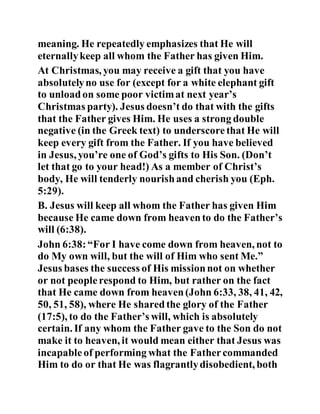
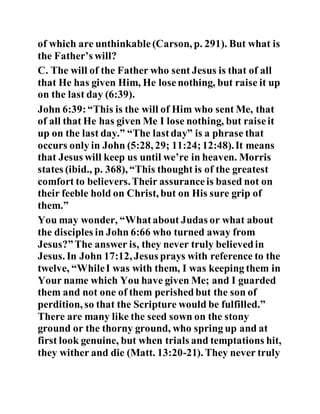
![believedin Christ. But those to whom Jesus gives
eternal life will never perish (John 10:28).
D. To sum up, the will of the Father is that everyone
who beholds the Son and believes in Him will have
eternal life and Jesus will raise him up on the last day
(6:40).
John 6:40 sums up what Jesus has been saying: “For
this is the will of My Father, that everyone who
beholds the Son and believes in Him will have eternal
life, and I Myself will raisehim up on the lastday.”
Again, this is a staggering claim that Jesus has already
made (5:28-29), that He will raiseus from the dead on
the last day so that we will be with Him forever.
Note that rather than referring to those whom He will
raiseup as those whom the Fatherhas given to Him,
here Jesus goes back to the invitationmode of 6:35.
There it was “he who comes to Me” and “he who
believes in Me.” Here, it is “everyonewho beholds the
Son and believes in Him.” “To behold” implies
knowledge of who Jesus is. You can’t believe in one
you know nothing about. John wrote this gospel to
show us who Jesus is—the Christ, the Son of God—so
that we may believein His name and have eternal life
(20:31). It’s interestingthat none other than John
Calvin(Calvin’sCommentaries[Baker], p. 254)here
calls “madmen” those who seek salvationin what he
calls “the whirlpoolof predestination,”rather than by](https://image.slidesharecdn.com/jesuswasawelcomer-200320144616/85/Jesus-was-a-welcomer-69-320.jpg)
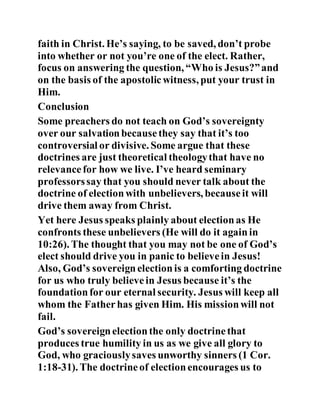
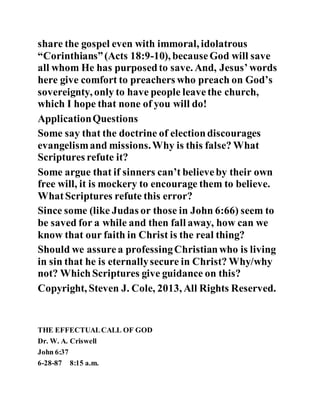
![And once againwelcome the throngs of you who are listening on radio. This
is the pastorof the First Baptist Church in Dallas delivering a sermon, a
textual sermon. Mostof the times the messagespresentedby the pastor will
be an exposition. It will be a passage;this morning it is a textual message
from John 6:37; John 6:37, and I have named it The Effectual Callof God.
The text is in two very distinct parts. First clause:“All that the Fathergiveth
Me shall come to Me.” Secondclause:“And him that comethto Me I will in
no wise castout” [John 6:37]. The first clause speaks ofpredestinating grace:
“All that the Father giveth Me shall surely, certainly come to Me.” You have
two verbs here in the English translatedalike:“shall … All that the Father
giveth Me shall come to Me; He that comethto Me” [John 6:37], in English,
both verbs translated in the same English word. They are altogetherdifferent
verbs; they move in a different world. “All that the Father giveth Me hekō,
shall surely and certainly and must come to Me”:hekō. You have an instance
of the use of the verb in the story of the prodigal son [Luke 15:11-32]. “Thy
brother hekō, has come; he has arrived, and the father hath killed for him the
fatted calf” [Luke 15:27]. Hekō:“is arrived, is come, is certainly here.” The
other verb, erchomai, is just the usual word for “come”:“He that cometh,”
erchomai.
Predestinating grace:“All that the Fathergiveth Me shall certainly and
inevitably and inexorably come;they will come” [John 6:37]. Apparently,
what God said to our Lord in glory: “You go down and be incarnate, a man in
that earth, and You suffer and die on the cross, and I will give You a people.
You will not suffer and die in vain; I will give You disciples and believers and
converts, and they will certainly come.” Predestinating grace;Godhas given
to our Saviora people. “All that the Fathergiveth Me shall certainly and
surely hekō, arrive, be there, is come” [John6:37].
The other part is free will: “And him that comethto Me I will no wise castout
[John 6:37]. The man that chooses to come, the one who accepts the love and
grace ofour Lord, I will acceptHim. If he will come, I will love and receive
him as My very own.”
There are two distinct lines of grace and revelationin God’s Holy Word. One
is God’s elective purpose and His effectualcalling, His predestinating grace;
that’s one line. The other line is free will: “I choose,I accept, I turn, I confess,
I repent, I believe.” And those two lines are parallel through all of human life
and experience:God’s predestination and our free will choice. I cannotmake
them meet; they are always parallel. I cannotunderstand the mystery of](https://image.slidesharecdn.com/jesuswasawelcomer-200320144616/85/Jesus-was-a-welcomer-72-320.jpg)
![them; but no one is able to make them cross. No one canmake them
contradict.
When a man is saved, he’s an Arminian. Arminius was the greatDutch
theologianwho was the expounder of free will, of free choice. Whena man is
saved, he’s an Arminian, always. “Look whatI did. I acceptedthe Lord. I
repented of my sins. I confessedthe Lord Jesus. I came to Him. It was at
such and such service, atsuch and such hour, and I was saved. I repented,
and I confessed, and I turned, and I believed, and I was saved.” He’s an
Arminian: “I did it.” But as surely as God lives, as he grows in grace and as
the days pass, he becomes a Calvinist, always:“God did it. Looking back,
God touched my heart, God called me, and Godsaved me. It was by God’s
love and by God’s grace and in God’s goodness thatI came to know the Lord,
always” [John6:44].
Long time ago, I forever settled in my mind those two greatdoctrines of the
Bible, and I have never been bothered by them since. There are two
nomenclatures in the kingdom of God, two of them, and if you’ll keepthem
separate, you’ll never have any problem, never. There are words, there is a
nomenclature that belongs up there. And when we speak ofHim up there, we
talk about almightiness, and sovereignty, and immutability, unchanging
immutability; we talk about omniscience and omnipresence and omnipotence,
and we talk about predestination and electionand foreknowledge. That’s the
language up there where God is. Downhere where we are, we use an
altogetherdifferent kind of language. We talk about free will; we talk about
choice;we talk about confession, repentance,salvation;we talk about
commitment and consecration. Theseare the words down here. And if you’ll
keepthem separate, you’ll never have any trouble. Up there it’s God, it’s
foreknowledge, it’s electionand predestination, it’s the omnipotence of
almightiness of the heavenly Father; and down here it’s confession, and
repentance, and choice, and free will.
Now having spokenof the text, may I expound upon its two parts? “All that
the Fathergiveth Me shall hekō, surely and certainly come to Me” [John
6:37]; these that God hath chosen, predestinatedin His sovereignchoice, has
given them to Christ. “Theywill certainly come to Me.” In God’s Holy
Scriptures we are told that up there in heaven, in the presence of the Lord
God, is a Book ofLife [Revelation20:12-15]. And in the seventeenthchapter
of the Revelation, it says that in that book are the names of all of those who
are saved, whose names are in that Book of Life, written before the foundation
of the world [Revelation17:8]. Before Godcreatedthis universe and flung
this planet out into space, Godwrote in that Book ofLife the names of those](https://image.slidesharecdn.com/jesuswasawelcomer-200320144616/85/Jesus-was-a-welcomer-73-320.jpg)
![who are given to Jesus, those who are saved, those who are in the kingdom.
We can’t look upon that book. There’s only One who is worthy. There’s just
One who is worthy to take the book and to break the seals and to look upon its
mysterious pages [Revelation5:2-9]. He is described as “the Lamb of God,
slain before the foundation of the world” [Revelation13:8]. I can’t see it, I
can’t read those names, I can’t look upon it; just the Lamb of God. But oh,
what a comfort to me to know that there is such a book, and in that book are
the names of those that God hath given to our Lord, who shall surely come to
Him [Revelation20:12, 15, 21:27;Luke 10:20].
There are those who will not come; they refuse to respond. Here in this
chapter, “No man can come to Me, exceptthe Fatherdraw him” [John 6:44],
and in the tenth chapter out of which you read, “You cannot believe because
you are not My sheep” [John 10:26]. There are some who will not respond.
No matter how you pray, or how you weep, or how you witness, or how you
testify, or how you make appeal, there are some who will not respond. But
there are some who will always turn; there are some who will always believe;
there are some who will always accept. The blood and suffering of Christ
[Matthew 27:32-50], shall not be poured out into this world in vain, and the
man that preaches the gospelwill not go without a recompense anda reward.
There will always be some who will turn and be saved, always. Some will
come, some will believe, some will turn, some will look to Jesus. Always, some
will come [John 6:37]. God’s predestinating grace grants to us who make
appeal and who pray and who preach, God’s predestinating grace willalways
bring us some [John 6:37].
If there were a greatplague in the city, and some are saved, why not you? If
there was a greatfamine in the land and many are starving, but some will live,
why not you? Your coming, your responding is a sign that God hath chosen
you.
How do they come? Is it because oftheir goodworks? Is it because they
merit salvation? The Scriptures say that our righteousnesses,our works, are
like filthy rags in His sight [Isaiah64:6]. How is it that they come? Is it
because ofsome intrinsic worth? Paul said, “I know that in me (that is, in my
flesh,) there is no goodthing” [Romans 7:18]. How do they come? Theycome
because ofthe constraining love of God in their hearts. God puts in their
hearts a love for the Lord and a wanting for Christ [2 Corinthians 5:14-15].
And if they want Christ, a thousand times over againChrist wants them.
Oh, the love of God that drew salvation’s plan!
Oh, the grace ofGod that brought it down to man!](https://image.slidesharecdn.com/jesuswasawelcomer-200320144616/85/Jesus-was-a-welcomer-74-320.jpg)
![Oh, the mighty gulf that God did span
When He gave us Jesus on Calvary!
[from “At Calvary,” William R. Newell]
That is God’s predestinating grace [John 6:37], and as I say, when you grow
older and experiencedin the faith and in the Lord, more and more and more
do you praise Godfor His goodnessesto you. It is less and less and less and
less of us, and more and more and more of Him, until finally it is nothing of us
and all of Him—God’s grace that reacheddown and savedme [John 6:37].
Now the secondone:“And him that cometh to Me I will in no wise castout”
[John 6:37]; free choice, my coming to the Lord. It’s an unusual thing the
way the text says. It begins with a plural, “all,” pan, “All, all that come to
Me.” But when we come to our secondverse, it becomes a singular: ton, “the
one,” translatedhere “him.” All that God has given to Jesus will certainly
come [John 6:37]. Then it becomes singularand particularly and personal:
“And him that cometh to Me I will in no wise castout” [John 6:37] There is a
solicitude on the part of God for eachone of us that is marvelous to
contemplate.
You, you, that “him”—”Him that cometh unto Me” [John 6:37]—that “him,”
that “him” can be from a drunkard’s hell; it can be from a brothel; it canbe
from the outcasts of humanity; it canbe from the slums of the city; it can be
from the gambler’s den. That “him” canbe any “him”; that “him” canbe
any sinner. All sinners, all of us, with our weaknessesandour foibles and our
failures, “Him that comethunto Me,” that “him” can be the brokenhearted
and the weary, these who have striven and have failed in life. That “him” can
be a young person, a child; it canbe an old somebody. If you’re old enoughto
sin, you’re old enough to die. “And him that cometh unto Me”:that “him”
can be anybody. It canbe I. It can be we.
“Him that cometh unto Me I will in no wise castout” [John 6:37]. You know,
the Greek is sometimes unusual. If you use a double negative in English, it
contradicts itself; it’s not—you just don’t use double negatives:“no, not
never.” Greek is just the opposite:it will pile up double negatives. And here
is one of them: “Him that cometh unto Me ou me, no not never will I casthim
out.” The Lord is so approachable. “We who are far off,” says Paul in
Ephesians 2, “are made nigh by the blood of Christ” [Ephesians 2:13]. The
greateighth chapterof the Book of Romans begins, “There is therefore now
no condemnation to them who are in Christ Jesus” [Romans 8:1].
“Him that cometh unto Me I will in no wise castout” [John 6:37]; the
approachablenessand the availableness andthe nearness ofour Lord. In the](https://image.slidesharecdn.com/jesuswasawelcomer-200320144616/85/Jesus-was-a-welcomer-75-320.jpg)
![days of His flesh, there thronged Him and crowdedaround Him the poor, and
the sick, and the blind, and the lame, and the halt, and the lost. He said, “I am
come to seek and to save those who are lost” [Luke 19:10]. And now that our
Lord is in heaven, He hasn’t changed:He is still our available Christ
[Hebrews 4:14-16].
“It is expedient for you,” He said, “that I go away” [John 16:7]. Were He still
in the days of His flesh and living in Jerusalem, how would we get to Him?
The throngs from the ends of the earth, the ships would clog the sea;the city
would be multitudinously pressedon every side. Our Lord now, this moment,
He is as near as your breath, He is closerthan your hands and your feet, and
you cantalk to Him, and you cantell Him all about every providence and
experience in life.
I was greatlymoved one time by a man telling, a pastor telling of an old
gentleman who, when his wife died, went to live with his daughter. And they
built a room for him, and there he lived the last of his life and his days in that
room in his daughter’s house. And one day the old gentleman came to see the
pastor who’s speaking, and saidto him, the old gentleman said, “You know, I
have a hard time feeling that God is near me, and I just wish I knew how to
get close to the Lord.” And the pastorhad an inspiration; he said, “I tell you
what you do, dad. You getyou a chair, an empty chair, and you put it by
where you sit, and you talk to the Lord Jesus in that chair, and He will hear
you and He will answer. You just talk to Him.” In the night, the old
gentleman, the old dad, went to be with the Lord. And when the funeral
arrangements were made, the daughter in the house saidto the pastor who’s
telling this story that I was listening to—the daughter said to the pastor,
“Pastor, it is the strangestthing, the strangestthing. When I went to see my
dad in the morning, in the night he had drawn up an empty chair, and I found
him there. He had died with his hand on that empty chair.”
Jesus is available! Jesus is approachable! Jesus is near. “He that cometh
unto Me,” any he, “he that cometh unto Me I will in no wise cast him out”
[John 6:37].
A concluding remark on the text: that’s the waywe are saved, by coming to
the Lord Jesus. Itis that simple and it’s that plain [John 6:37]. There is
never ever anything mysterious about the way we are saved. We are savedby
coming to the Lord, always. Our Lord said it like this: “As Moseslifted up
the serpentin the wilderness, so must the Son of Man be lifted up” [John 3:14-
15; Numbers 21:8-9], and we’re saved by a look at the crucified One.](https://image.slidesharecdn.com/jesuswasawelcomer-200320144616/85/Jesus-was-a-welcomer-76-320.jpg)
![Could I add to it like this? I have flown severaltimes over the mouth of the
Amazon River. So greatis the pressure of that stream that for five hundred
miles out into the Atlantic the wateris fresh; the push of that river out into
the Atlantic. There was a ship without water, destitute, and the sailors dying.
And they calledto another passing ship, “Whatshall we do? We have no
water!” And the answercame:“Justdip it up and drink! Just dip it up and
drink!” That’s the abounding grace of our Lord for us: just eat, my brother;
eat the bread of life [John 6:35, 41, 48, 51]. Just drink, my brother; drink the
waterof life [John 4:13-14]. It is that simple. There is not one wayto be
savedfor Peter, Paul, and James, and John, and anotherway for us; we all
are savedalike [John 6:37]. There’s not some mysterious door through which
those apostles enteredinto the love and grace and heart of Christ, and we
come in another way; all of us come in the same way: just loving the Lord,
just coming to Jesus [John6:37], just believing in Him [John 3:14-16], just
trusting in Him [Acts 16:30-31]. And when I do that, I have eternal life:
My sheephear My voice, and I know them . . .
And I give unto them eternallife; and they shall never perish, neither shall
any one pluck them out of My hand.
My Father, who gave them Me, is greaterthan all; and no one is able to pluck
them out of My Father’s hand.
I and My Father are one.
[John 10:27-30]
I’m saved, and I’m safe, and I’m secure. No lion of the pit will ever be able to
take awayone of the sheepof His flock, and no demon from hell will be able to
wrestfrom the hand of God the Fatherthe humblest one who has sought
refuge in Him [John 10:29].
And repeatedand repeatedin this passage, 39:“All that the Father hath given
Me will come, and I will raise him up at the lastday” [John 6:39]. The next
verse:“This is the will of Him that sent Me, that every one that seekeththe
Son, and believeth on Him, hath everlasting life; and I will raise him up at the
last day” [John 6:40]. Forty-fourth verse:“Any one that comes to Me the
Father will draw him, and I will raise him up at the last day” [John 6:44].
Again, “Whoso eatethMy flesh, and drinketh My blood, hath eternal life; and
I will raise him up at the lastday” [John 6:54]. In that little passagethere,
four times: “I will raise him up at the last day” [John 6:39-54].
Sweetpeople, Jesus notonly saves our souls [Hebrews 10:39], and saves our
spirits [1 Thessalonians 5:23], but He also has promised to resurrect and to](https://image.slidesharecdn.com/jesuswasawelcomer-200320144616/85/Jesus-was-a-welcomer-77-320.jpg)
![immortalize and to re-create our human bodies [John 11:25-26]. The whole
purchased possessionshallbe immortalized and redeemed[Ephesians 1:14].
Paul closedthe third chapter of Philippians, “Forour citizenship is in
heaven,” our home is in heaven. It’s not here; it’s in heaven [Philippians
3:20]. Our reward is not here; it’s in heaven:
For our citizenship is in heaven;from whence we look for the Savior. . . Who
shall change our vile bodies, that they may be fashioned according to His
glorious body, according to the working whereby He is able to subdue all
things unto Himself.
[Philippians 3:20-21]
We are saved and saved forever, and somedayGod will raise, out of
corruption and death, these bodies [1 Corinthians 15:50-57;1 Thessalonians
4:14-17]. And we’ll be fashionedand made like unto our Savior[Philippians
3:21]; He our elder Brother, and we of His household of faith [Galatians 6:10].
Oh, bless God, and praise His name forever!
In this moment, when we sing our hymn of appeal, thus to come to the Lord
[Romans 10:9-10], to answerthat callin your heart, or with a family you, to
put your life in the circle of our dear church or to answera call of God to you
in your heart, on the first note of the first stanza, come, and a thousand times
welcome. Makethe decision now, and when we sing our song, down one of
those stairways, down one of these aisles:“Pastor, this is God’s day for me,
and here I stand,” while we sing, while we stand, while we come, while we
wait, while we pray.
GreatTexts of the Bible
Christ’s Doctrine of Election
All that which the Father giveth me shall come unto me; and him that cometh
to me I will in no wise castout.—John6:37.
1. After claiming to be the Bread of Life, and condemning the Jews’attitude
towards Himself, Jesus announced His assurance that notwithstanding their
unbelief all that the Fathergave Him would come to Him, and then
immediately uttered the gracious words whichhave given confidence and
courage to all approaching Him through the centuries, “Him that cometh to](https://image.slidesharecdn.com/jesuswasawelcomer-200320144616/85/Jesus-was-a-welcomer-78-320.jpg)
![me I will in no wise castout.” In this twofold declarationthe Lord revealed
two aspects ofone greateffect, the heavenly and the earthly. The heavenly
takes in the whole result, “All that which the Father giveth me shall come unto
me.” The earthly declares the individual responsibility, and utters the word
creating confidence, “Him that comethto me I will in no wise castout.”
2. The tone in which the words are spokensupplies another element in the
picture. Jesus seems to pause after saying, “Ye have seen me, and yet believe
not.” It is a sorrowfulfact, and it is very mysterious. Here are His own people
rejecting Him, or at any rate coming to Him in such a wrong fashionthat He
has to discourage them. It looks as though God’s plan of salvation were not
working out right. Is it going to fail at the outset? Suchquestions must crowd
into the Saviour’s mind, as He faces the fact that these people will not accept
Him. But they are not allowedto cloud His faith for an instant. At once the
Son acquiescesin the Father’s plan. It is all right; it cannot fail. “All that
which the Father giveth me shall come unto me.” Nobody will be lost whom
the Fatherdesignedto save. “Him that cometh to me I will in no wise cast
out.” I am doing My part correctly. So all must be well.
The Commander-in-Chief at the base of operations decides upon the plan of
campaign, and entrusts its execution to another Generalwho never doubts the
strategythough it does not appear successfulimmediately, and never doubts
His own perfectfulfilment of the plan.1 [Note: J. E. Roberts.]
Mark well this passage, “Iwill in no wise casthim out.” Our Saviour doth
plainly import that there neither is nor can be devised—no, not by God
Himself—any one considerationwhatsoeverwhichmight occasionHim to put
off or saynay to any person that doth come. No considerationin the world, I
say, can so aggravate a man’s condition, could he make it as bad as the devils
themselves, yet, if there be a coming to Christ, there can be no consideration
in the highest pitch of sinfulness for Christ to reject, or put by, a person
coming to Him. Foryou must know, beloved, Christ is well acquainted with
all the objections the heart of man (nay, the devil) can objectagainstthe
freeness ofHis grace and life by Him. To save labour, therefore, in this one
passage(I will in no wise castout) Christ at once answers allthe objections
that could be made. And I dare be bold to maintain, in the name and stead of
Christ, let a personbut sayand lay down this for granted, that come he
would—that he would have Christ rather than his life,—letthis be granted for](https://image.slidesharecdn.com/jesuswasawelcomer-200320144616/85/Jesus-was-a-welcomer-79-320.jpg)
![a truth, I will be bold with Christ out of this passageto answerten thousand
objections, evenfully to the silencing of every objectionthat canbe made; “I
will in no wise casthim out”; I will in no wise, that is, I will upon no
considerationthat can be imagined or conceived.2 [Note:Tobias Crisp.]
I
The Father’s Part
“All that which the Fathergiveth me shall come unto me.”
At once the question suggestsitself, Who are given by the Fatherto the Son?
The context supplies an answer. The charge brought by Jesus againstthese
Jews is, “Ye see and believe not.” He has declaredalready, “This is the work
of God, that ye believe on him whom he hath sent.” It seems evident,
therefore, that “that which the Father giveth” includes all who believe on the
Son. That may include everybody. “Whosoeverwill” may believe. But to
believe is the essentialcondition. Therefore the greattruth of our text is that
all who believe are saved. It sounds a commonplace:but considerwhat it
means. Take a few cases. A is a denizen of the slums, poor in pocketand in
education; B is a University professor, ofhigh moral instincts and intellectual
attainments; C is a RomanCatholic scientist; D is a cannibal on a mission
station on the Congo. Now suppose eachofthese convictedof sin and desiring
to trust Jesus. Theircircumstances vary enormously. Coming to Christ and
reaching Him mean very different experiences. A never uttered a prayer in his
life, and scarcelyunderstands any article of the Christian creed;B has
consideredthe creed carefully and critically, and has been accustomedto
reverent worship; C has to acceptdogmas on the authority of the Church,
though his reasonmay contradictthem; D has dim conceptions of Godand is
governedby savage instincts which cannotbe eradicatedin a brief time. Does
it seemat all likely that four men placedin such different circumstances
should eversucceedin finding God in Christ? Jesus says they shall. “All that
which the Father giveth me shall come unto me.” No lack of knowledge, no
spirit of caution, no church dogma, no savage instinctshall hide the face of
God in Christ or keepa seeking soulfrom the Saviour. Coming from Eastand
Westand North and South, the guiding starshall gather them all at the feet of
the Sonof God.](https://image.slidesharecdn.com/jesuswasawelcomer-200320144616/85/Jesus-was-a-welcomer-80-320.jpg)
![The Christian doctrine of electionusedto be freely preached; but it was
sometimes mis-stated, and therefore it was misunderstood. So it fell into
disuse. Now it seems to be too much neglected. If it means what some people
think it means—that God electeda certain number of individuals without
reference to their moral fitness for salvationand consignedall the restof
mankind to eternalperdition—I do not wonder it is neglected. Suchteaching
conflicts with our knowledge ofGod and has no shred of evidence in the
Scriptures. Its true meaning is given in this verse. God has electedfor
salvationnot this or that individual, but all people who believe in His Son
whom He hath sent. This may be all. God wants it to be all. All who believe
are saved. That is, God elects, not the individuals, but the means, and
guarantees that all who use the means shall be saved.1 [Note:J. E. Roberts.]
As to this matter of election, I would to God that some who objectto it had as
much common sense in this matter as they have in the daily actions of
ordinary life. I ask for no higher degree ofcommon sense. Let me assume that
a purse has been lost in the street adjoining our place of meeting; the purse
contains a thousand guineas; whoeverfinds that purse may keepit. “Ha!” we
say, “well, only one canfind it; therefore what is the goodof a thousand
seeking it? Only one can have it; and if I am electedto be the man, it will come
in my way.” I never heard people reasoning so with regard to an affair of that
kind. Though only one may have it, ten thousand will strive for it if they know
the conditions. There is a prize to be given in the school. It is one prize; there
are five hundred scholars in the school. The boys say, “Well, only one of us
can getit, why should five hundred of us be toiling and fagging for it?”
Another boy says, “I know if I am to have the prize, I will getit; so I shall read
no books, and make no preparation.” You would not allow a boy to reasonso.
Yet there are men who say this, “If we are calledto heaven, we’ll getto
heaven; if we are electedto be saved, we need not make any effort about it.”
Thou wickedand slothful servant; out of thine ownmouth I condemn thee;
the whole actionof thy evil life shall be thy answeron the day of judgment,
and thou shalt be condemned to an ignominious silence because ofa self-
accusing conscience.1[Note:J. Parker.]
I am thankful to believe that my final salvationdoes not depend wholly on
myself. If it did, it would be at stake to the very last! Salvationinvolves so
much. It includes deliverance from sin, development of character, fitness to](https://image.slidesharecdn.com/jesuswasawelcomer-200320144616/85/Jesus-was-a-welcomer-81-320.jpg)
![dwell with God. Man’s faith is often such a frail thing. It were a poor refuge, if
there were no Divine purpose to support it. It becomes a sure defence if God
says, “I pledge that man’s deliverance.” Here is a man battling with a rough
sea. A belt is flung to him. What hope of deliverance canhe have by clinging
to a few pounds of cork? This hope, that there are fifty strong arms pulling
him through the surf to the shore. Do not push the simile too far. The
Christian life is not simply clinging to a belt; it is a daily conflict with
temptation. But it is gloriously true that faith in Christ transfers the
responsibility of salvationto the Saviour, and makes deliverance certain.
Though I graspthe hand of Christ I might lose it in a moment of doubt or
weakness,orwhen my feet enter the chill waters of the river of death. Thanks
be unto God for the assurance that if I claspthe hand of Christ He grips mine,
and none can pluck me out of that strong clasp. It is my sheetanchor amidst
the storms of life and the floods of death.2 [Note: J. E. Roberts.]
BecauseI seek Thee not, oh seek Thoume!
Becausemy lips are dumb, oh hear the cry
I do not utter as Thou passestby,
And from my life-long bondage setme free!
BecausecontentI perish, far from Thee,
Oh seize me, snatchme from my fate, and try
My soulin Thy consuming fire! Draw nigh
And let me, blinded, Thy salvationsee.
If I were pouring at Thy feet my tears,
If I were clamouring to see Thy face,](https://image.slidesharecdn.com/jesuswasawelcomer-200320144616/85/Jesus-was-a-welcomer-82-320.jpg)
![I should not need Thee, Lord, as now I need,
Whose dumb, dead soul knows neither hopes nor fears,
Nor dreads the outer darkness of this place—
BecauseI seek not, pray not, give Thou heed!1 [Note:Louise Chandler
Moulton.]
II
Man’s Part
“Him that cometh to me.”
1. “Coming” is the only way of salvation. If there could have been any other
way, this one would never have been opened. It is not conceivable that God
would have given His only-begotten and well-belovedSon to die upon the
cross ofCalvary in order to save sinners if there had been any other wayof
saving them that would have been as consistentwith the principles of infallible
justice. If men could have enteredinto everlasting life without passing along
the path stainedand consecratedby the blood of Jesus, surelythat blood
would never have been “shedfor many for the remissionof sins.” The very
fact that this new and living way has been openedproves that there is no
other, for God would never have provided it unless it had been absolutely
necessary.
2. But what is “coming”? The people He was addressing had followedHim for
miles, and had found Him and were speaking to Him, but they had not
“come” to Him. To come to Him is to approachHim in spirit, and with
submissive trust; it is to commit ourselves to Him as our Lord; it is to restin
Him as our all; it is to come to Him with open heart, accepting Him as He
claims to be; it is to meet the eye of a present, living Christ, who knows what is](https://image.slidesharecdn.com/jesuswasawelcomer-200320144616/85/Jesus-was-a-welcomer-83-320.jpg)
![in man, and to sayto Him, “I am Thine, Thine most gladly, Thine for
evermore.”
An Irish boy was askedwhat was meant by saving faith. “Grasping Christ
with the heart,” said he. The truest answerpossible. And faith is only another
word for coming. The man who grasps Christ with the heart, “comes.”1
[Note:R. D. Dickinson.]
3. The one essentialin coming is the desire to come. Christ pledges His gift to
readiness of heart. As to the open eye the light pours in, and to the listening
ear the music enters, so to the longing heart Christ gives the pardon and the
purity and the peace which, though it has not shaped its need into those
words, are in reality the gifts for which it yearns. The value of a photographic
plate consists not in what it is, but in its readiness to receive the impression
when the shutter of the camera is opened and the light streams in. If a mere
piece of common glass were there insteadof the plate, the light might shine on
it for everand no impressionwould be made; it is the prepared plate that
receives the impression which the light conveys. So, too, it is the prepared soul
that receives the gift of Christ. The one thing that the Saviour asks for is
readiness, willingness, some movementof the life towards Him; if there is that
within us we need not fear that Christ, who is light, will fail to bring His
blessing to us or to leave His mark on us. Everything is possible to us if we are
open to the influence of God. What is it that we want Christ to do for us? Is it
to cleanse awayour sin? He points us to His cross. Do we want restfrom an
accusing conscienceand from the weary load of loneliness? “Come unto me,”
He says, “and I will give you rest.” Is what is deepestin us still unsatisfied,
although we have been seeking many fountains and drinking from many
cups? “He that believeth on me shall never thirst.”
At one critical time during this period of soul-conflicthe stated in one of his
addresses that the question, “Believe ye that I am able to do this?” was made a
word of life to him. He writes: “I was very near death; I was almost
despairing. The only thing that kept my head above waterwas the promise,
‘Him that cometh to me I will in no wise castout.’ I repeatedit againand
again, and prayed very earnestly, when the word came to me with such power,
and with such a rebuke, ‘Believe ye that I am able to do this?’ He was able,
and I believed Him, and He did it.”1 [Note:K. Moody-Stuart, Brownlow
North, 41.]](https://image.slidesharecdn.com/jesuswasawelcomer-200320144616/85/Jesus-was-a-welcomer-84-320.jpg)
![(1) Unfitness is no barrier to coming.—It is strange how people are inclined to
wait a little, to try to prepare themselves for Christ! They know how unlike
Him they are, and how unfit they are for His presence and service;so, as a
youth who waits awhile to prepare himself for some important examination,
or as a soldierwaits awhile to perfect himself in drill for some promotion—so
they think they can wait. But their waiting never changes their nature or
renews their heart. Fortheir case is rather like that of those who suffer from a
malignant disease.No amount of waiting or even of attention to the outward
signs of the disease is of any avail, and the time spent over that but increases
the danger;for the disorder is within, the whole system is poisonedand needs
renewing, and it is to save their life that they at once put themselves in the
hands of a qualified physician. Christ Jesus is the qualified physician, and His
blood is a “full, perfect, and sufficient sacrifice, oblation, and satisfactionfor
the sins of the whole world.”
I have heard of a cavalierwho lost his life because he stopped to curl his hair
when Cromwell’s soldiers were after him. Some of you may laugh at the
man’s foolishness;but that is all that your talk about fitness is. What is all
your fitness but the curling of your hair when you are in imminent danger of
losing your soul? Your fitness is nothing to Christ. Remember the hymn—
Let not consciencemake you linger,
Nor of fitness fondly dream;
All the fitness He requireth
Is to feel your need of Him.2 [Note: C. H. Spurgeon.]
(2) Emptiness and not fulness is required.—Before a building is erectedit is
necessaryto excavate fora foundation, which involves the removal of much
that seems important. And it is literally true that Christ wants not our fulness
but our emptiness, that He may “build us up in our most holy faith.” We think
ourselves full, and are reluctant to part with anything; whereas we are
“poor”—destitute ofeverything that is necessaryto appear before Godwith;](https://image.slidesharecdn.com/jesuswasawelcomer-200320144616/85/Jesus-was-a-welcomer-85-320.jpg)
![we are “wretched,” being altogetherout of harmony with the eternal joys of
heaven; and we are “blind” to our actualcondition, to our own welfare, and
even to the salvationso freely provided and so fully revealedby Christ our
Saviour, till the eyes of our understanding are opened, and we are led to see
and desire the many things we need. And the faith that saves is that which
takes us out of ourselves, where there is nothing, to Christ, where there is
fulness for all we need—purity, peace, and joy, “without money and without
price.”
From all thou holdestprecious, for one hour
Arise and come away,
And let the calling Voice be heard in power;
Desertthyself to-day;
If with thy Lord for once thou turn aside,
With Him thou’lt fain abide.1 [Note:J. E. A. Brown.]
4. The coming is a personal coming to a personalSaviour.—How personalthe
text is concerning both the one coming and the One to whom he is to come:
“him that cometh to me.” That is the long and the short of the whole matter,
its Alpha and Omega, its beginning and its end; there must be a personal
coming to the personalChrist. It will not suffice for us to come to Christ’s
doctrines. We must, of course, believe what He taught; but believing His
teaching will not save us unless we come to Him. It will not be enough merely
to come to Christ’s precepts, and to try to practise them,—an utterly
impossible task for our own unaided strength; we must first come to Christ,
and then, when we trust in Him for salvation, His gracious Spirit will “take of
the things of Christ, and shew them unto” us.
In simple trust like theirs who heard](https://image.slidesharecdn.com/jesuswasawelcomer-200320144616/85/Jesus-was-a-welcomer-86-320.jpg)
![Beside the Syrian sea
The gracious calling of the Lord,
Let us, like them, without a word
Rise up and follow Thee.2 [Note:Whittier.]
III
Christ’s Part
“I will in no wise castout.”
1. Christ’s accessibility.—“Jesusneverslept in a walledtown” is the striking
remark of a literary writer. There never lived so open a man, so accessible
always to all. Sitting at the well of Sychar, and talking freely to the first
comer; receiving Nicodemus by night; listening to the Syro-Phœnician
mother, who breaks through His concealment;preaching to the five thousand,
who disturb His retirement,—He is the property of every man that wants
Him, and leaves us an example to follow His steps.
2. Christ’s longing for response.—“Ionce knew a mother,” says Canon
Duncan, “who had a sonwho suffered from paralysis of the brain. Yet, how
she loved and caredfor him! But the cause ofher greatgrief was this; she
said: ‘I have nursed him from childhood, cleansed, fed, and clothed him,
watchedover him and supplied his every want, tried to please him, and to
teachhim little things, and now, though in years he is a man, yet he does not
even know me, and shows no return of my love, but just lies there to eat and
drink and sleep!And I feel that I cannotgo on; I am just longing for some
recognition—someresponse to my lifelong love and care!” How many are
there, though not afflicted like that son, who nevertheless treattheir God and
Saviour much the same!He sacrificedHis very life for them; fed, clothed, and](https://image.slidesharecdn.com/jesuswasawelcomer-200320144616/85/Jesus-was-a-welcomer-87-320.jpg)
![caredfor them day by day; and has called them by His providence, by His
word, and by every token of love, and yet they give no response.
He utters this word Himself, that, howeverlong men may neglectit, however
long it may be that they see and hear, and yet believe Him not, when they do
finally come, He cannot, and will not, and must not castthem away.1 [Note:
Schleiermacher.]
It is the greatness ofThy love, dear Lord, that we would celebrate
With sevenfold powers.
Our love at best is cold and poor, at best unseemly for Thy state,
This best of ours.
Creatures that die, we yet are such as Thine own hands deigned to create:
We frail as flowers,
We bitter bondslaves ransomedat a price incomparably great
To grace Heaven’s bowers.
Thou callest:“Come at once”—andstill Thou callestus: “Come late, tho’
late”—
(The moments fly)—
“Come, every one that thirsteth, come—Come prove Me, knocking at My
gate”—](https://image.slidesharecdn.com/jesuswasawelcomer-200320144616/85/Jesus-was-a-welcomer-88-320.jpg)
![(Some souls draw nigh!)—
“Come thou who waiting seekestMe—Come thou for whom I seek and
wait”—
(Why will we die?)—
“Come and repent: come and amend: come joy the joys unsatiate”—
—(Christ passethby …)—
Lord, pass not by—I come—andI—and I. Amen.1 [Note: Christina G.
Rossetti, Poems, 164.]
3. The certainty of Christ’s welcome.—Everyone who will come to Christ is
sure of a welcome. Thatis the emphatic messageofthe text. The words used
by our Lord are the strongestpossible. Sweetlyfamiliar as the music of the
English version is, it scarcelyrepresents their double emphasis. Literally they
read, “Him that comethto me I will not, not castout.” That is to say, to use a
modern phrase, there is not the slightestfearof his being castout. A heart
burdened with a spiritual need will never be repelled; a man panting with a
spiritual desire may be absolutelycertain that when he comes to Christ he will
be welcome. “Oh!” cries Bunyan, “the comfort that I have had from this word
‘in no wise,’as who should say, by no means, for no thing, whatever he hath
done But Satanwould greatlylabour to pull this promise from me, telling me
that Christ did not mean me. But I should answerhim again—Satan, here is,
in this word, no such exception, but him that comes, him, any him—‘him that
cometh to me I will in no wise castout.’ ” Bunyan was right. The welcome is
for all, without any reserve or any exception, or any condition, save that of
willingness to come.
Of other ten adults at this time admitted, one was speciallynoteworthy. She
was about twenty-five, and the Elders objectedbecause hermarriage had not
been according to the Christian usage onAniwa. She left us weeping deeply. I](https://image.slidesharecdn.com/jesuswasawelcomer-200320144616/85/Jesus-was-a-welcomer-89-320.jpg)
![was writing late at night in the coolevening air, as was my wont in that
oppressive tropical clime, and a knock was heard at my door. I called out—
“Akaiera?” (= Who is there?)
A voice softly answered,—“Missi, it is Lamu. Oh, do speak with me!”
This was the rejectedcandidate, and I at once opened the door.
“Oh, Missi,” she began, “I cannotsleep, I cannot eat;my soul is in pain. Am I
to be shut out from Jesus? Some ofthose at the Lord’s Table committed
murder. They repented, and have been saved. My heart is very bad; yet I
never did any of those crimes of Heathenism; and I know that it is my joy to
try and please my Saviour Jesus. How is it that I only am to be shut out from
Jesus?”
I tried all I could to guide and console her, and she listened to all very eagerly.
Then she lookedup at me and said—
“Missi, you and the Elders may think it right to keepme back from showing
my love to Jesus atthe Lord’s Table; but I know here in my heart that Jesus
has receivedme; and if I were dying now, I know that Jesus would take me to
Glory and present me to the Father.”
Her look and manner thrilled me. I promised to see the Elders and submit her
appeal. But Lamu appeared and pled her own cause before them with
convincing effect. She was baptized and admitted along with other nine. And
that Communion Day will be long remembered by many souls on Aniwa.1
[Note:John G. Paton, ii. 282.]
4. The fulness and freeness ofChrist’s welcome.—Aman may have been
guilty of an atrocious sin, too black for mention; but if he comes to Christ he
shall not be castout. To that atrocious sin he may have added many others, till
the condemning list is full and long; but if he comes to Christ he shall not be
castout. He may have hardened his neck againstthe remonstrances of](https://image.slidesharecdn.com/jesuswasawelcomer-200320144616/85/Jesus-was-a-welcomer-90-320.jpg)
![prudence, and the entreaties of mercy; he may have sinned deeply and
wilfully; but if he comes to Christ he shall not be castout. He may have made
himself as black as night, as black as hell; yet, if he shall come to Christ, the
Lord will not casthim out.
This is the Charter of Christianity—that there lives no sinner too bad for
Jesus to save. A year ago I met a doctor possessedof far more than ordinary
gifts in dealing with one of our most fataldiseases.Fromall parts of the
country men and womenwhose lives have been despairedof by their own
physicians have journeyed to this man’s consulting-room, and have placed
their last hope of recoveryin his mysterious powers. And he described to me
the pathos of his work. Foragain and again he has to face a body of anxious
patients who are waiting from his lips their sentence oflife or of death; and,
while he is able to restore many to perfect health, he knows that he will find
others for whom he cando nothing. Such is the lot of every physician but One.
There is One to whom no case is hopeless;who never yet sent patient away
unhealed. “Him that cometh to me I will in no wise castout.”1 [Note:H.
Bisseker, Sunday Evenings in Methodism, 153.]
Lord, dost Thou me invite
To sit in white
At the greatFeastwhich for Thy friends is spread?
I could not be so bold,
In raiment poor and old;
Rather without Thy gates would stand unfed.
Thy messengermistook
My hungry look,](https://image.slidesharecdn.com/jesuswasawelcomer-200320144616/85/Jesus-was-a-welcomer-91-320.jpg)
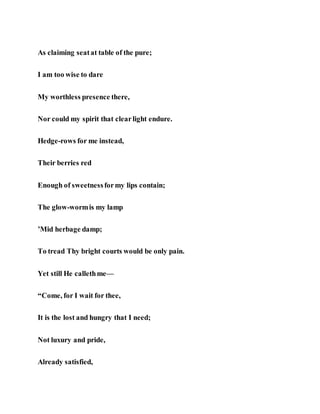
![The humble and the poor My feastshall feed.”2 [Note:J. E. A. Brown.]
Christ’s Doctrine of Election
THE FATHER'S GIFT TO THE SON
"All that the Father giveth Me shall come to Me; and him that comethto Me I
will in no wise castout."--John 6:37.
IN THESE chapters we are engagedin catching up some of the favourite
thoughts and words of the Redeemer, thinking them over again, and trying, so
far as we can, to look at them with his eyes and from his stand-point. And we
cannot leave this marvellous chapter without accentuating an expression
which comes into prominence here for the first time, but is destined to re-
appear more than once or twice--that expressionis, those whom the Father
giveth Me. And may it be that all who read these lines shall be included in that
casketofvery precious jewels which the Father has given to his Son! There is
nothing higher in this world or the next to which any human being can aspire.
I. WHO ARE THEY?
We may not look into the Book of Life, and read the names written there from
before the foundation of the world. One only cantake that book, and break its
seals, andlook upon its mysterious pages. The Lamb alone, whose blood
purchased eachindividual mentioned there, may scanits records. But it is not
necessarythat that book should be opened or read ere we know its contents.
There is anothermethod of ascertaining the names it records.
The verse quoted above contains an identical proposition. Its extremes may be
reversedin their order, for eachis the other's equivalent. And if, on the one
hand, it is true that all the given ones shall come;it is also true, on the other
hand, that all who come are included among the given ones. Would you know
whether you are one of these? Ask yourselfif you have truly come to Christ,
or believed in Him as Saviour, Friend, and King; for if you have, you may rest
assuredthat you were included in that Divine donation, which dates from the](https://image.slidesharecdn.com/jesuswasawelcomer-200320144616/85/Jesus-was-a-welcomer-93-320.jpg)
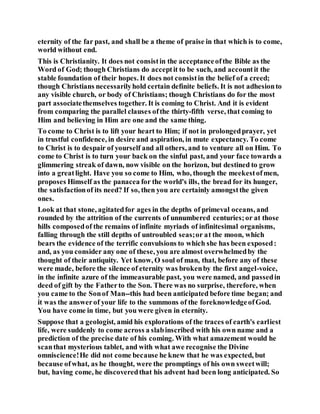
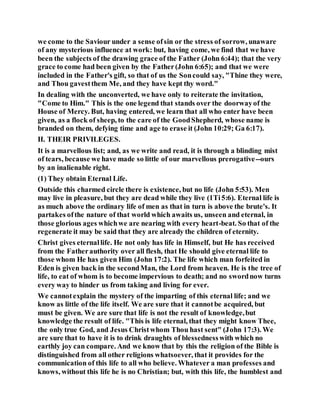
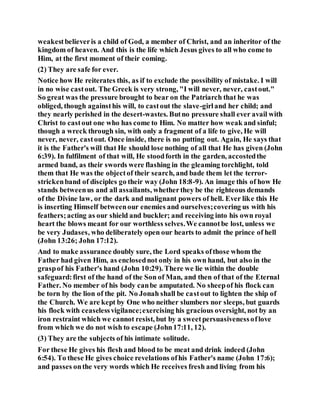
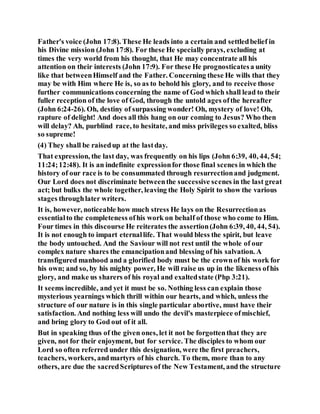
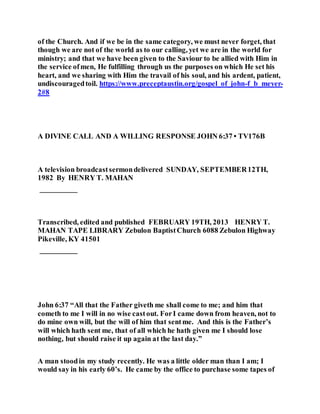
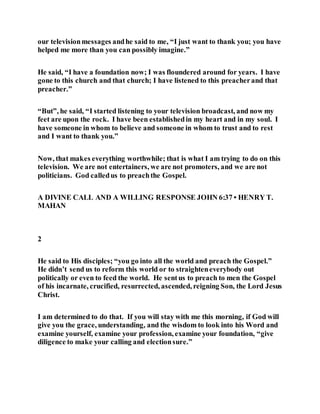
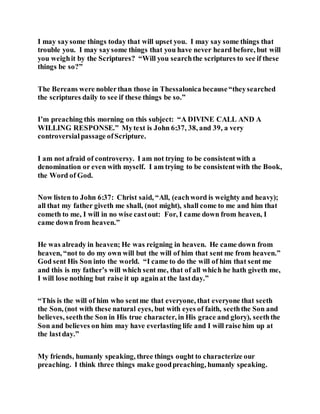
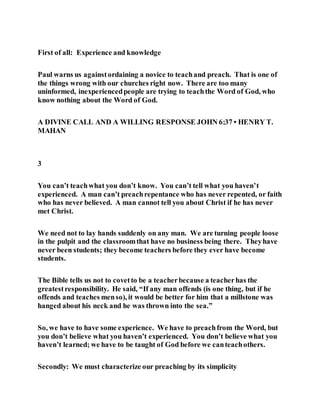
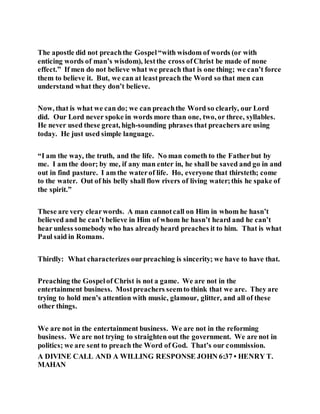
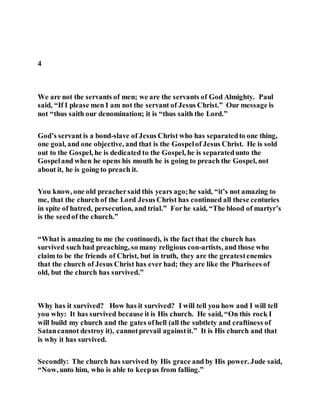
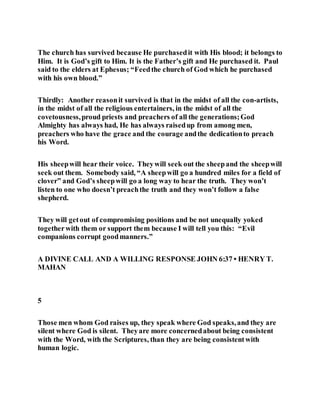
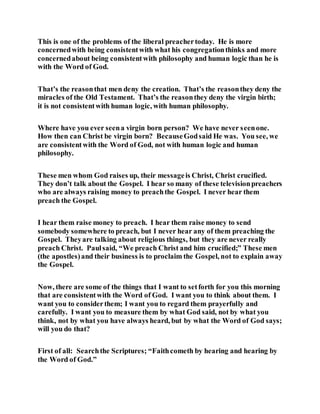
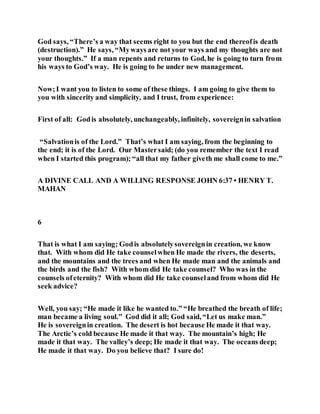
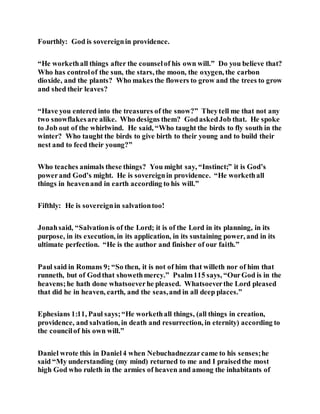
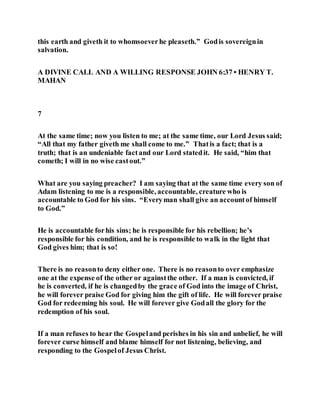
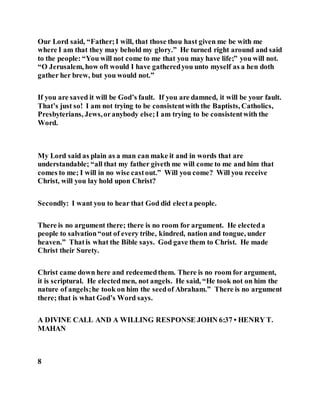
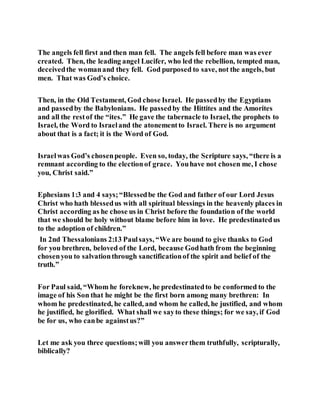
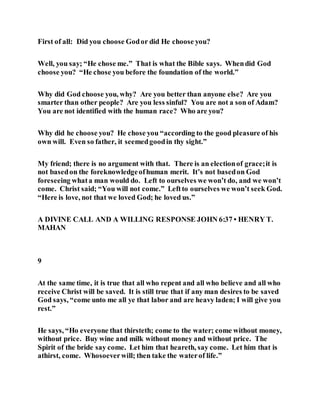
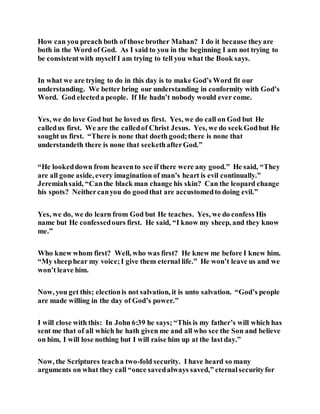
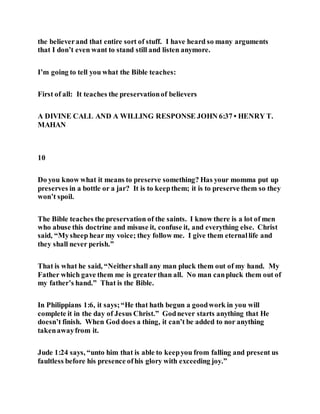
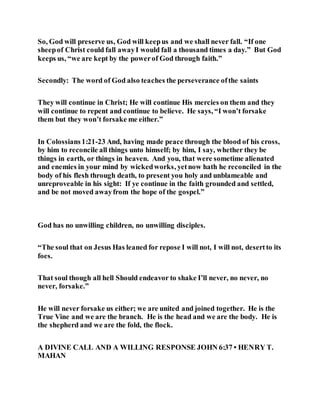
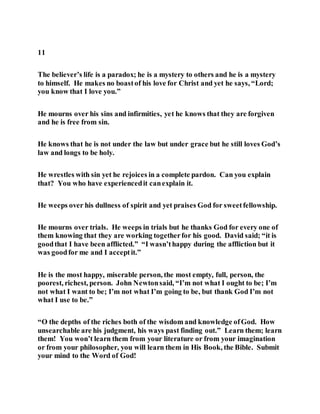

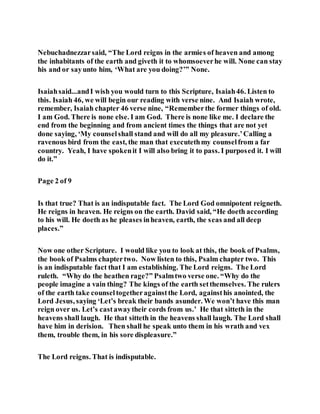
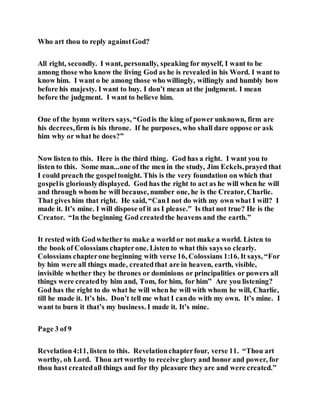

![1 Samuel two verse one Hannah prayed and said, “My heart rejoicethin the
Lord. My horn is exalted in the Lord. My mouth is enlargedover mine
enemies because I rejoice in thy salvation. There is none as holy as the Lord
for there is none beside thee. Neither is there any rock like our God. Talk no
more so exceedinglyproudly. Let not arrogancycome out of your mouth, for
the Lord is a God of knowledge and by him actions are weighed. The bows of
the mighty men are brokenand they that stumble are girded with strength.
They that were full have hired out themselves for bread and they that were
hungry see so that the barren hath born sevenand she that hath many
children is waxed feeble. The Lord kills and the Lord makes alive. The Lord
brings down t the grave and brigs up. The Lord maketh poor. The Lord
maketh rich. The Lord bringeth low. The Lord lifteth up.”
Who does these things? God does. He is the Creator. The Lord is king. Who
then shall dare to resisthis will or distrust his characteror murmur at his
wise decrees ordoubt his
Page 4 of 9
steadfastpromises? The Lord is king, child of the dust. The Judge of all this
world is just. Holy and Righteous are all his ways. So let every creature sing
his praise.
All right. Now listen to me. Those are the indisputable facts. [?] The Lord is
an indisputable, absolute sovereignmonarch who reigns over all his creation
because he made it.
Secondly, God has the right to do—watchthis, now—to do what he will when
he will with whom he will not only because he is the Creator, of all things and
it belongs to him by those rights of creation, but he has the right to do with
you and me what he will because he is the Judge of this earth. He is the Judge.
He is the Judge, not a judge, the Judge.
Now an illustration. This is highly important right here. Change your whole
way of thinking if you see this. Here is what I am saying. The Constitution of
the United States of America of which I am a citizen guarantees me freedom,
the right to go where I please, live where I please, work where I please and do](https://image.slidesharecdn.com/jesuswasawelcomer-200320144616/85/Jesus-was-a-welcomer-120-320.jpg)
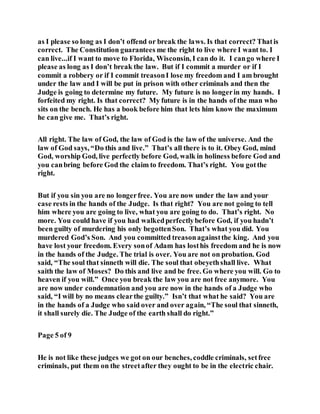
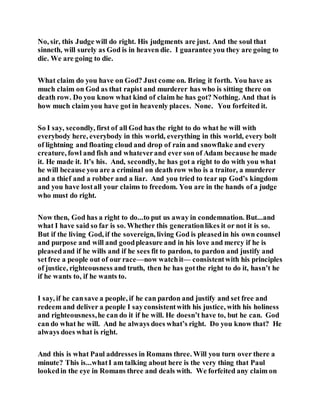
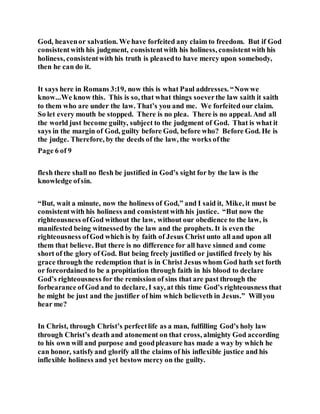
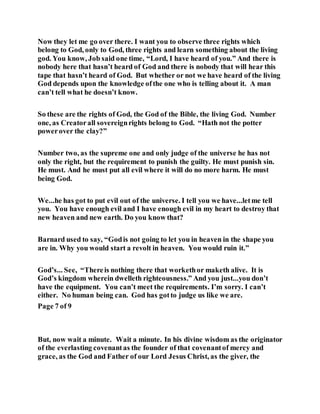
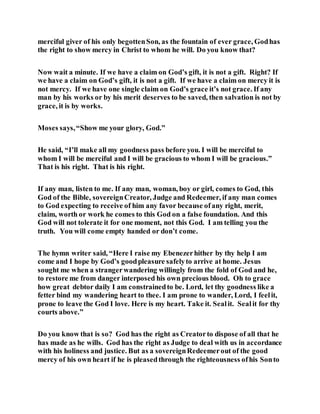
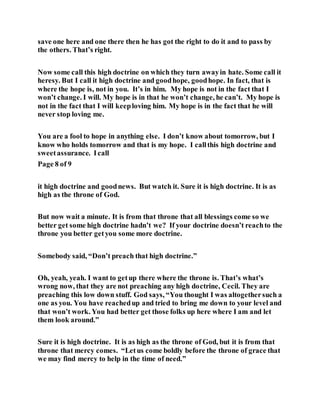
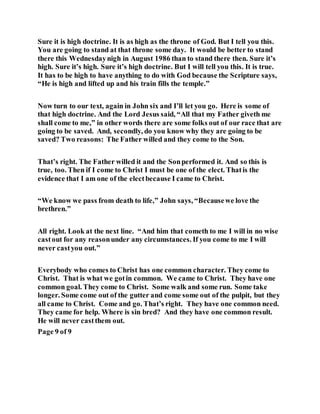
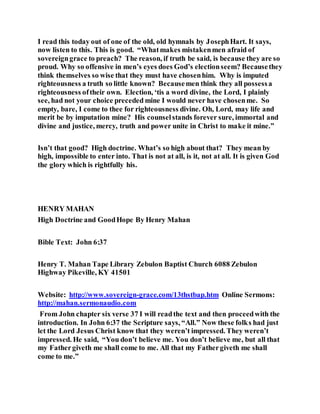
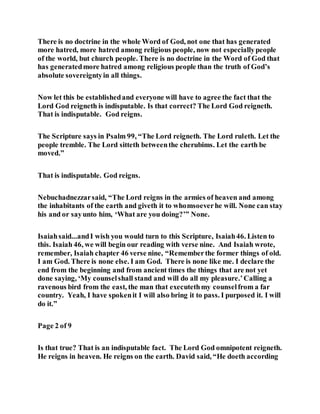
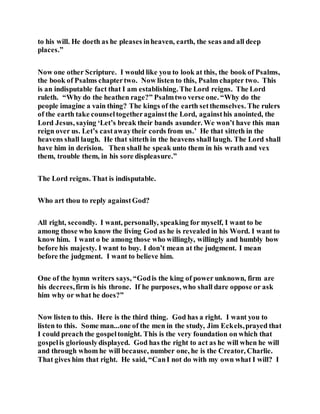
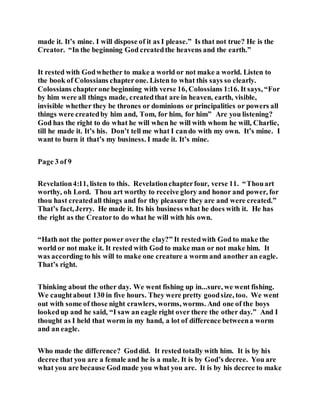
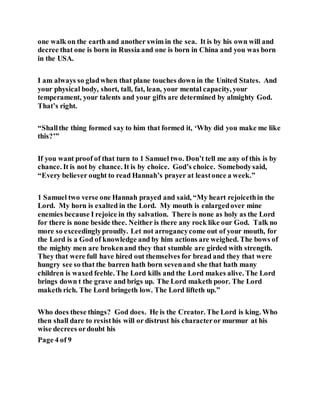
![steadfastpromises? The Lord is king, child of the dust. The Judge of all this
world is just. Holy and Righteous are all his ways. So let every creature sing
his praise.
All right. Now listen to me. Those are the indisputable facts. [?] The Lord is
an indisputable, absolute sovereignmonarch who reigns over all his creation
because he made it.
Secondly, God has the right to do—watchthis, now—to do what he will when
he will with whom he will not only because he is the Creator, of all things and
it belongs to him by those rights of creation, but he has the right to do with
you and me what he will because he is the Judge of this earth. He is the Judge.
He is the Judge, not a judge, the Judge.
Now an illustration. This is highly important right here. Change your whole
way of thinking if you see this. Here is what I am saying. The Constitution of
the United States of America of which I am a citizen guarantees me freedom,
the right to go where I please, live where I please, work where I please and do
as I please so long as I don’t offend or break the laws. Is that correct? Thatis
correct. The Constitution guarantees me the right to live where I want to. I
can live...if I want to move to Florida, Wisconsin, I can do it. I cango where I
please as long as I don’t break the law. But if I commit a murder or if I
commit a robbery or if I commit treasonI lose my freedom and I am brought
under the law and I will be put in prison with other criminals and then the
Judge is going to determine my future. My future is no longerin my hands. I
forfeited my right. Is that correct? My future is in the hands of the man who
sits on the bench. He has a book before him that lets him know the maximum
he can give me. That’s right.
All right. The law of God, the law of God is the law of the universe. And the
law of God says, “Do this and live.” That’s all there is to it. Obey God, mind
God, worship God, live perfectly before God, walk in holiness before God and
you canbring before God the claim to freedom. That’s right. You gotthe
right.
But if you sin you are no longerfree. You are now under the law and your
case rests in the hands of the Judge. Is that right? You are not going to tell](https://image.slidesharecdn.com/jesuswasawelcomer-200320144616/85/Jesus-was-a-welcomer-133-320.jpg)
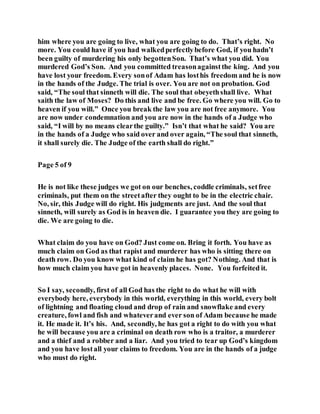
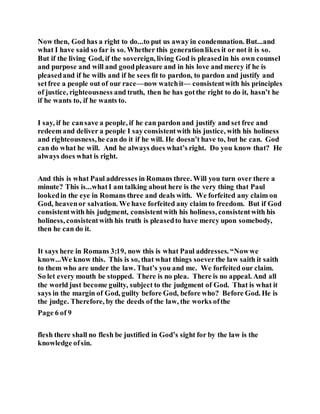
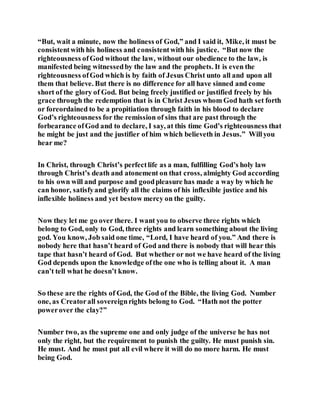
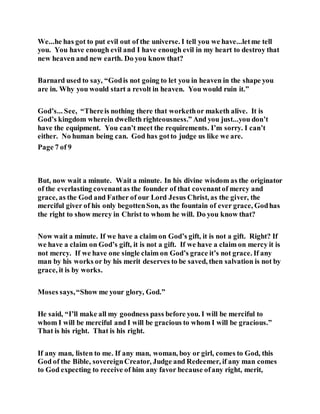
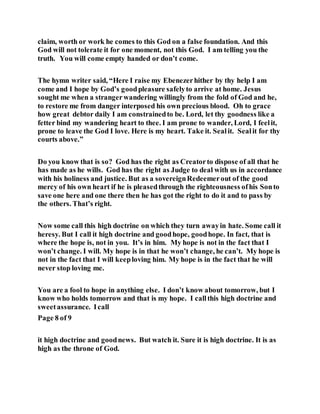
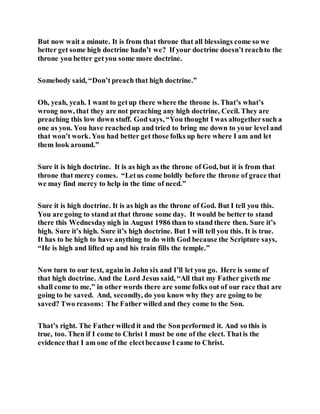
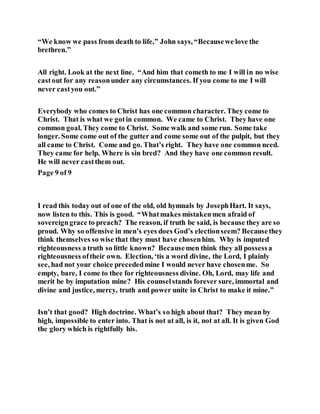
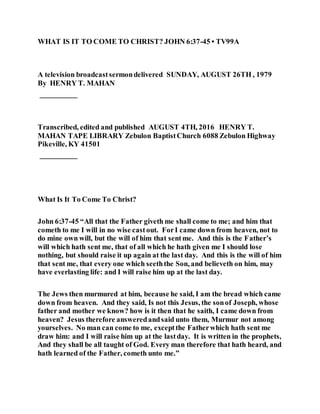
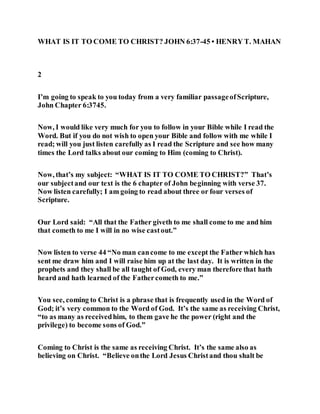
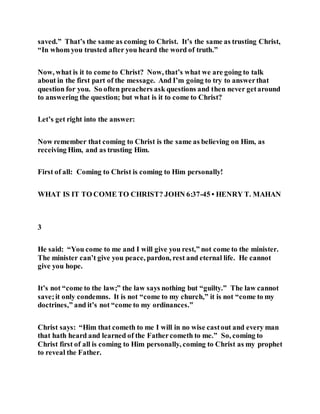
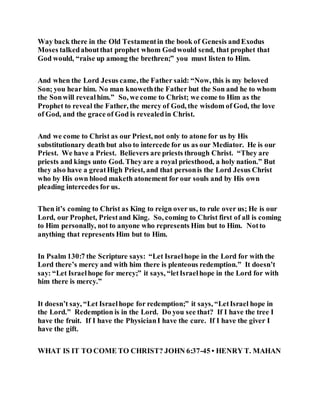
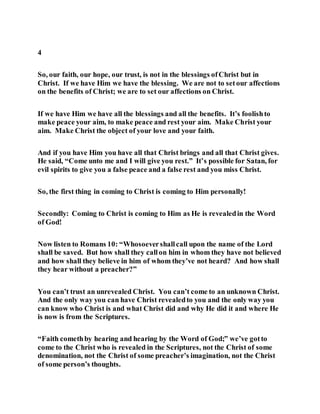
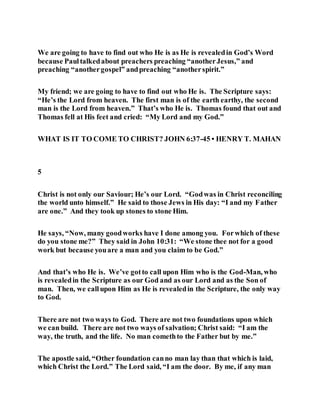
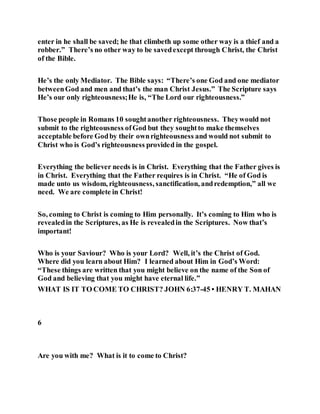
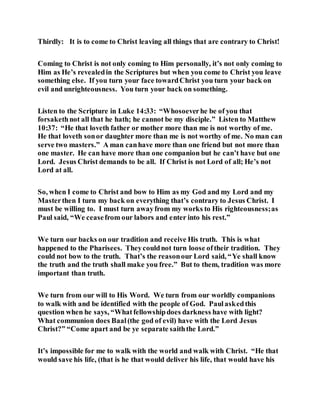
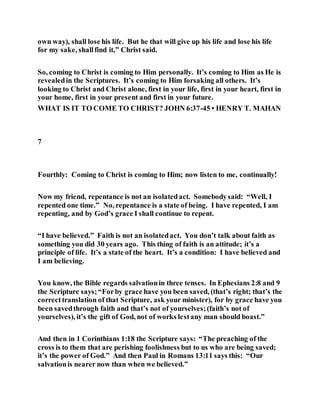
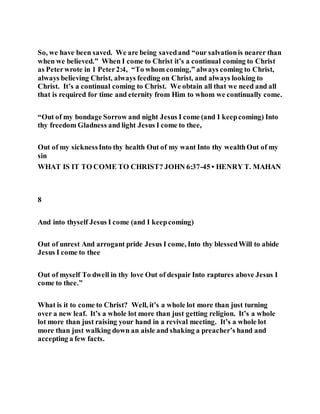
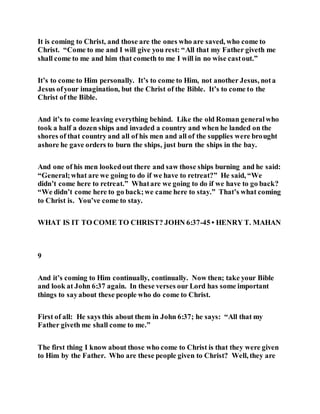
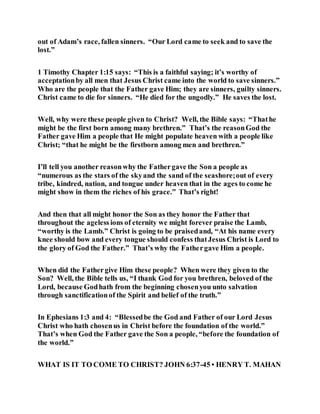
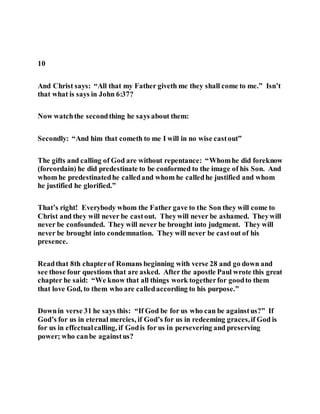
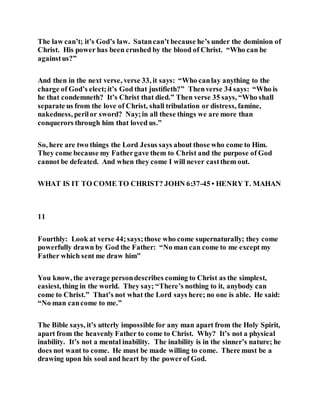
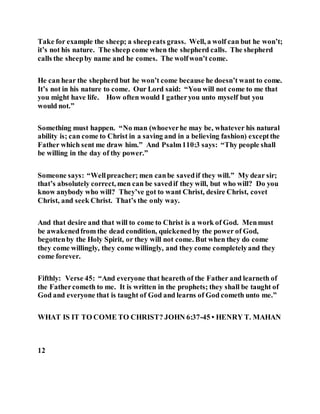

![Christ said; “And all those who are taught of God, they will come to me, they
will come to me. Those given me by the Father, (those taught of the Father,
and wooedand drawn by the Father); they will come to me and I will never
castthem out!”
“The Father’s Gift to His Son” December15, 2013 Text: John 6:36-40
There are doctrines in Scripture we do not fully understand, and which,
frankly, seem to contradictother doctrines. And yet the Bible clearlydeclares
them both true. Q: How are we as Xns to deal w/ this dilemma? A: We open
our hearts to God’s Word, as little children are open to whatevertheir trusted
fathers teachthem. If that results in a system of thoughts that don’t all
logicallymatch up w/ one another, so be it; we simply assume that God’s
thoughts are too grand for our finite human brains; That His mind follows
paths that range too far afield beyond our understanding, for us to map them
out; But that whatever He has revealedto us about those things we cannot see,
is absolutely true/reliable, because ourFather wouldn’t deceive us. What we
don’t do, is try to harmonize 2 seeminglycontradictory doctrines, by toning
down one to accommodate the other; Nor to adopt a modified position
betweenthe 2 extremes. We assume the truth is found w/i them, just as they
are revealedin Scripture; not in some speculative middle ground between
them, that we invent.
- 2 -
It is very dangerous to become either selective/creative w/God’s truth, rather
than believing all that He reveals, simply learning to live w/ what seemto be
contradictions, from our myopic p.o.v. Today’s text contains a prime example
of this principle. John 6:37 (Jesus)=> “All that the Father gives Me will come
to Me, and the one who comes to Me I will certainly not castout.” Take that
1stclause=> “All that the Father gives Me.” That is a statementof the fact
that God has electedand foreordainedcertain people to eternallife. Eph 1:4
tells us He chose them in eternity past. They are the ones whom the Father has
given to His Son. Referring to man’s salvation, Paul writes (Rom 9:16)=> “It
does not depend on the man who wills, or the man who runs, but on God who
has mercy.” Jn 1:13 says=> “[they] were born, not of blood nor of the will of](https://image.slidesharecdn.com/jesuswasawelcomer-200320144616/85/Jesus-was-a-welcomer-157-320.jpg)
![the flesh nor of the will of man, but of God.” You may be uncomfortable w/
God’s sovereignelection, but you cannotavoid this doctrine in Scripture
w/o twisting the clearmeaning of the Bible’s words. Now look at the 2nd
clause in Jn 6:37 where Jesus says=> “The one who comes to Me [by an act of
his ownwill] I will certainly not castout.” That is an equally clearstatement
of man’s free agency, by which he comes to Jesus basedon a decisionhe
himself makes, and entrusts his soul to X as his Savior.
- 3 -
He has chosento come, & X certainly won’t casthim out. So, is a personsaved
because he/she is among the elect;or because that person has decided to
believe in Jesus? The answeris both; but the minute we saythat, someone is
going to protest, “It has to be either one or the other.” Our answer=>
Scripture declares both, we believe both, but we cannot explain how the 2 fit
togetherlogically. And we are OK with that. What we know for sure from
God’s Word is that people who come to X & trust in Him are among those
given by the Father to His Son—youcannot deny that is true & continue to
claim you believe Jesus orHis words. A corollarytruth: Those who refuse to
come to Jesus have not been given to X by the Father, & they are among those
Jesus describedin Jn 10:26-28 when He said=> “You do not believe because
you are not of My sheep. / My sheephear My voice, & I know them, & they
follow Me; / and I give eternallife to them.” Who gave Jesus those sheep?
His Father, who had claimedthem for His own before the beginning of time.
And yet, because man is responsible for his choice to believe or withhold his
faith in X, the blood of those who don’t believe will be upon their own heads,
because ofthe choice they’ve made.
- 4 -
We freely admit that the final solutions to such mysteries lie (at present) in
God’s mind, not ours; I.e., from the p.o.v. of God’s infinite mind, there is no
conflict, but from our limited p.o.v., they are mysteries. ** We can, however,
at leastidentify some of the principles that serve as the building blocks of
those mysteries we ultimately don’t understand. In today’s text we can
identify 4 principles, that help us understand a little about the mystery of our
salvation… * The principle of human freedom: Man has the freedom not to
believe in Jesus (we will meet some people who didn’t) * The principle of
divine election: The Father sovereignlygives believers to the Son, and He
chooseswhichones, on that basis of His own holy discretion, and His own
inscrutable purposes. * The principle of divine preservation: Believers are
sovereignlypreserved, and resurrected, by Christ, so they can never lose their](https://image.slidesharecdn.com/jesuswasawelcomer-200320144616/85/Jesus-was-a-welcomer-158-320.jpg)
![salvation. * The principle of human faith: Believers receive eternallife, as
they behold Jesus, andbelieve in Him.
- 5 -
* The Principle of Human FreedomAgain, this refers to the fact that man has
the freedom not to believe in Jesus, disregarding all the evidence to the
contrary, if he so chooses.[John6:36] (Jesus to a crowd)=> “‘But I said to you
that you have seenMe, and yet do not believe.’” Jesus had demonstratedHis
divine power to these people, but they had chosennot to be convincedby the
evidence He had given them, and not to believe in Him. One might argue that
they viewed Him merely as a prophet who workedmiracles (like Elijah in the
OT), but that they hadn’t seenenoughyet, to regardHim as the Son of God.
But even if that were the case, they could have come to Him, & askedopen-
mindedly who He was. Theydidn’t, because the only thought on their minds
was, “How canwe getHim to do more miracles for us?” People like this can
be shown astounding miracles, & it will only serve to stiffen their unbelief.
God has given you enoughfreedom over your own mind so that, if you are
determined to disbelieve/disobeyHis revealedWord, even knowing that your
unbelief will somedayland you in hell, forever, you can choose to do so. That
is your God-given prerogative.
- 6 -
Jesus told the Galileancrowd, “You have seenMe,” & He used a word that
refers to seeing with perception/discernment. These people’s unbelief was not
due to ignorance. Theyhad enough visual evidence/experience ofJesus and
His miracles, so that they should have perceived something of His divine
nature. But His miraculous actions had not led them to discern that He was
the Sonof God, because that’s not what they were looking for—it’s not what
they wanted to see. As Heb 4 (vs 2) says, what they heard/saw of Jesus didn’t
profit them, because it was not united w/ faith. That hadn’t been the case w/
Jesus’owndisciples as He walkedout to them on the Sea of Galilee, & rescued
them/theirboat from deadly winds. When He had abruptly stopped the wind
that was about to capsize their boat, the disciples prostrated themselves before
Him, in worship. But this Galileancrowd, seeing Him healpeople & watching
Him create bread/fish, just came back for more of the same the next day.
Human nature shamefully uses man’s God-givenfreedom in refusing to](https://image.slidesharecdn.com/jesuswasawelcomer-200320144616/85/Jesus-was-a-welcomer-159-320.jpg)
=>
“‘All that the Father gives Me will come to Me, and the one who comes to Me
I will certainly not cast out.’” The Fathersovereignlychoosescertainpeople
to be among those He has given as a gift to His Son. Being well aware of this,
Jesus prays to the Father Jn 17:2=> “You gave Him [X] authority over all
flesh, that to all whom You have given Him, He may give eternal life.” Verse
24=> “Father, I desire that they also, whom You have given Me, be with Me
where I am, so that they may see My glory which You have given Me.” John’s
Gospelclearlyindicates God the Father has given some people (not all people)
to His Son, as a gift. In the past these people had once used their human
freedom to reject Jesus, but now they have come to believe in Him. That is
only true because they are included in God’s gift to His Son, so the Spirit has
intervened to change their will. * He has granted them repentance from their
sins. E.g. Acts 11:18=> “Godhas granted to the Gentiles also the repentance
that leads to life.” Why? So they would come to Jesus. * In addition, He has
granted them the faith to believe in X.
- 8 -
Eph 2:8=> “By grace youhave been savedthru faith; & that not of
yourselves, it is the gift of God.” If they had not been among those the Father
has given to X, they never would have come to Jesus, orbelieved in Him. But
because Godhad chosenthem before time began, for the great/gracious
privilege of salvation, He had targetedthem for this specialgift of His
grace/love. As a result, they have come to believe in X. The refusal of some
people to believe in Jesus does notfrustrate God’s eternal purposes
whatsoever. His divine sovereigntywouldn’t allow human freedom to do that.
Nor did He choose others becauseHe knew they’d later believe. He chose
them according to His ownsovereign/inscrutable purposes. But men’s refusal
to believe undoubtedly createdsadness in X’s heart, knowing the eternal
destruction they would face because ofit. God, in His sovereignty, does not
choose to include every man/woman in that specialrelationship w/ its special
treatment by which He changes sinners’hearts, so that they willingly come to
X. Those who would accuseGodof unfairness, for leaving some out, forget
why God’s plan of redemption was even necessaryin the first place.](https://image.slidesharecdn.com/jesuswasawelcomer-200320144616/85/Jesus-was-a-welcomer-160-320.jpg)
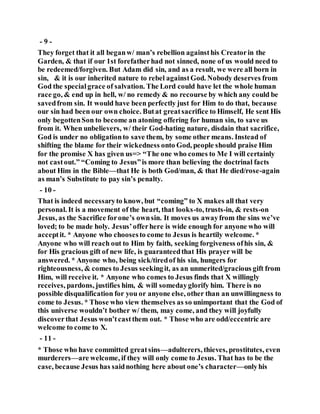
![coming. * Those who have resistedthe H.S., covering up a troubled conscience
for years, Jesus stillwelcomes to come. * Those who fear they are apostates
because they once professedto believe in X, but walkedaway& went back to
the world. God says to them in Jer 3:22=> “Return, O faithless sons, I will
heal your backslidings.” * If hearing Jesus’words puts a lump in their throats
& a desire to really have the relationship w/ Him they once claimed to have; *
And if they come to Him, sincerelyseeking forgivenessoftheir unfaithfulness,
they aren’t really apostates, afterall, because X’s promise holds true for them
too=> “The one who comes to Me I will certainly not castout.” * Those who
fear they aren’t repentant enough, can still come. Peter=> “He [X] is the one
whom God exalted to His right hand as a Prince & a Savior, to grant
repentance to Israel, & forgiveness ofsins” (Ac 5:31). It is not for us to bring
our repentance to Jesus, but rather to come to Him for our repentance.
- 12 -
Don’t let Satanuse that to confuse you, & keepyou from coming to X. But
having come to Jesus, under any/all of these circumstances, look back to God,
& praise Him in Jesus’name, knowing you could never have done so, if He
hadn’t enabled you to. Praise His name that, in spite of all the wrong you’ve
ever done, in His view you are part of a precious gift that He has given to His
beloved Son—amazing, but true. * The Principle of Divine PreservationThe
principle=> Jesus sovereignlyprotects/preservesa believer’s salvation, & will
faithfully perfect/resurrecthim in the end. [Vss 38-39]--“‘ForI [X] have come
down from heaven, not to do My ownwill, but the will of Him who sent Me. /
[And] this is the will of Him who sentMe, that of all that He has given Me I
lose nothing [of it], but raise it up on the last day.’” Jesus would never castout
anyone who came to Him, not only because He loves the person, but even
more to the point of our text, the Father loves him, & it’s the Father’s will
that Jesus save him—not lose him. The Son’s will is always in perfect
harmony w/ the Father’s will. Jesus told His disciples (4:34)=> “My food is to
do the will of Him who sent Me and to accomplishHis work.” Jesus sacrificed
the glories/joyofheaven, & came to earth that He might save to uttermost-
perfection, eachone of God’s elect, whom the Father had given to Him—not
losing even one.
- 13 -
The job won’t be done until X resurrects us all in regenerated, glorified
bodies, filled w/ new life like X’s life; And He matches those bodies up w/ our
sanctified/perfectedsouls. Whatwas the Father’s will, which Jesus came to
do? The preserving of our faith, & the resurrection of our bodies. Notonly
does Jesus welcome allof God’s elect, who come to Him to be savedfrom their](https://image.slidesharecdn.com/jesuswasawelcomer-200320144616/85/Jesus-was-a-welcomer-162-320.jpg)
![sin; Once He has savedthem, He keeps them saved. This is the greatdoctrine
of the perseverance (orthe preservation) of the saints. You sometimes hear it
referred to as our “eternalsecurity.” Someone:“But what if a Xn just walks
awayfrom the faith?” A: If he’s truly one of those the Father has given to His
Son, he will come back to the faith, before he dies. Godwon’t let go of him, or
let him enter eternity unsaved. We know that, because ofJesus’words in Jn
10=> “My Father, who has given them to Me [again, the electare God’s gift
to the Son], is greaterthan all; and no one is able to snatch them out of the
Father's hand.” Couldn’t someone snatchhimself out of God’s hand? Only if
his hand were bigger/strongerthan God’s hand. I love the way Wm
Hendriksen put it=>
“Scripture teaches a counselthat cannot be changed, a calling that cannot
- 14 -
be revoked, an inheritance that cannot be defiled, a foundation that cannot be
shaken, a sealthat cannot be broken, and a life that cannotperish.”
I grew up thinking not only that I could lose my salvation, but believing that I
was actually doing so every week. Ican tell you from personalexperience, that
is an absolutelymiserable/frightening way to live. To this day I bless the name
of the preacherwho taught me from Scripture these blessedtruths, that Jesus
X will never lose those, God has given to Him, and the Fatherwill never
loosenHis grip on their souls. Paul wrote to the Philippians=> “I am confident
of this very thing, that He who begana goodwork in you will perfectit until
the day of Christ Jesus” (Phil 1:6). He explained it to the Romans like this=>
“We know that God causesall things to work togetherfor goodto those who
love God, to those who are called according to His purpose [that’s the elect]. /
For those whom He foreknew, He also predestined to become conformed to
the image of His Son, so that He would be the firstborn among many
brethren; / and these whom He predestined, He also called; and these whom
He called, He also justified; and these whom He justified, He also
glorified”(Rom8:28-30). There are no weak links in this chain, & X will never
lose a single believer, from His foreknowing us in eternity past, to our
glorificationin eternity future. When it’s all said/done, we’ll look back & say
“Praise God, He really did work all things togetherfor good.”
- 15 -
Charles Spurgeonsaid of certain preachers, that they seemto be](https://image.slidesharecdn.com/jesuswasawelcomer-200320144616/85/Jesus-was-a-welcomer-163-320.jpg)
![“busy trying to shut sinners out of the Kingdom of God… afraid that more
people should get savedthan ought to be… afraid lest there should be in the
Heavenly fold one that is not the Lord Jesus Christ’s sheep.”
But when Jesus’people getto heaven, they will find that everyone who should
be there, will be there, because X hasn’t losta one, & they’ve all been
perfected. That’s why Jude 24 extolled the glory of “Him who is able to keep
you from stumbling, & to make you stand in the presence of His glory
blameless with great joy.” * The Principle of Human Faith The principle=>
Beholding/believing into Jesus Christ is the means by which believers receive
eternal life. Again, Jesus frames this as the Father’s will for us=> [Verse 40]=>
“‘Forthis is the will of My Father, that everyone who beholds the Sonand
believes in Him will have eternal life, and I Myself will raise him up on the
last day.’” By the word “behold,” Jesus means to look at Him carefully. To
gaze at Him, to examine His words/deeds/life, andto contemplate the meaning
of what we see/hearin Him. If we do so w/ faith, we will discoverthat X is
God’s Son. It takes more than a passing glance—it’s a continual beholding for
the purpose of understanding. Yet by the same token, it’s a simple looking,
just as the Israelites who had been bitten by snakes in Num 21:9 simply
lookedat the bronze serpent on a pole, & were healed.
- 16 -
“Believing,” as we have seenbefore, is taking all that we have discovered
while beholding Jesus, & personalizing it, weaving it into a personal
relationship w/ Him. It’s more than “believing in” Jesus intellectually, since
the wording is literally “believing into” Him, forming an identification w/
Him, and a relationship of trust w/ Him, by which we rely on Him (& Him
alone)to forgive/save/regenerateus. Jesus saidthat everyone who
beholds/believes-into Him “has eternallife”—it reads as a future tense, but
it’s actually a presenttense verb. The moment anyone/everyone believes, he
has eternallife. In vs 27 of this chapter, Jesus had told the crowd to seek the
food “which endures to eternal life”—the bread of life (Jesus Himself) who
gives man abundant life. Jesus gives life, preserves life, & will raise it up on
the lastday. Then/there eternal life will be consummated in us, as our
humanness is restored/glorifiedto all God intended for us, when He originally
createdus in His image. All that is required of man in order to attain such
wonderful, abundant life is that he behold/believe-into Jesus. Butthis is where
man’s will comes in, because the person himself must do so, as an act of his
will. As Jesus put it verse 29 of this passage=> “This is the work of God, that
you believe in Him whom He has sent.”](https://image.slidesharecdn.com/jesuswasawelcomer-200320144616/85/Jesus-was-a-welcomer-164-320.jpg)
![- 17 -
Some people fear they cannot be saved because Godmay not have included
them in His gift to His Son. But right here Jesus has given us the answer=>
“Everyone who beholds the Son and believes in Him will have [has] eternal
life.” So behold/believe, and receive eternal life—that proves you have been
included, & are 1 of Jesus’sheep. If you weren’t included, you couldn’t have
beheld/believed. The thief on the cross didn’t stop to ask Jesus, “Am I one of
those who were chosenby God?” He just said, “Jesus, remember me.” A
hungry man doesn’t wonderif it’s God purpose that he eat, nor a tired man if
it’s Godpurpose that he sleep. They just eat/sleep, & feel grateful to God for
these blessings. So you too, just look to Jesus, place your faith in Him, and
then gratefully worship Him, for what He has done for you=>
washed/cleansed/clothedyou, & fed you the bread of life. Jesus is worthy of
your trust/worship, for He is indeed the obedient Sonof God.
- 18 -
“The Father’s Gift to His Son” December15, 2013
Text: John 6:36-40
1. There are doctrines in Scripture which seemto contradict other doctrines;
yet the Bible clearly declares them both [10 true]. Jn 6:37; Eph 1:4; Rom
9:16; Jn 1:13; 6:37
2. Is a personsavedbecause he or she is among the elect, or because that
person has decided to believe in Jesus? [10 Both]. Jn 10:26-28
3. The final solutions to such mysteries lie in God’s mind, [8 not] ours.](https://image.slidesharecdn.com/jesuswasawelcomer-200320144616/85/Jesus-was-a-welcomer-165-320.jpg)
![In today’s text we can identify four principles that help us understand a little
about the mystery of our salvation… * The Principle of Human Freedom
[John 6:36] 4. Jesus had demonstratedHis divine powerto these people, but
they had chosennot to be convinced by the evidence He had given them and
not to [16 believe] in Him. Heb 4:2
5. Human nature shamefully uses man’s God-given freedom in refusing to
believe even when it is [16 logical]to believe. Jn 6:44
* The Principle of Divine Election[Verse 37] 6. The Father sovereignly
choosescertainpeople to be among those He has given as a [10 gift] to His
Son. Jn 17:2, 24; Acts 11:18;Eph 2:8
7. The refusal of some people to believe in Jesus does not frustrate [12
God’s] eternalpurposes whatsoever.
8. Coming to Christ is a movement of the heart that looks to, trusts in, and
rests in Jesus, as the Sacrifice for one’s [8 own] sin.
- 19 -
9. Anyone who comes to Jesus finds that Christ willingly receives, pardons,
and justifies him; there is no possible disqualification for anyone, other than
an unwillingness to [10 come] to Jesus. Acts 5:31
* The Principle of Preservation10. Jesus sovereignlyprotects and preserves a
believer’s salvation, and will faithfully perfect and [20 resurrect]him in the
end. [Verses 38-39]
Jn 4:34
11. What if a Christian walks awayfrom the faith? If he is truly one of those
the Fatherhas given to His Son, he will come [10 back]to the faith. Jn
10:29;Phil 1:6; Rom 8:28-30](https://image.slidesharecdn.com/jesuswasawelcomer-200320144616/85/Jesus-was-a-welcomer-166-320.jpg)
![12. Christ will never lose a single believer, from His foreknowing us in
eternity past, to our glorification in eternity [14 future]. Jude 1:24
* The Principle of Human Faith 13. Beholding and believing into Jesus Christ
is the means by which believers receive [16 eternal] life. [Verse 40]Num
21:9
14. “Believing” is taking all that we have discoveredwhile beholding Jesus
and personalizing it, weaving it into a [18 personal] relationship with Him.
Jn 6:27, 29
15. Look to Jesus, place your faith in Him, and then gratefully [16 worship]
Him for what He has done for you.
http://www.mastersbible.com/documents/Sermons/John/48.John%206.36-
40.pdf
C. SIMEON
CHRIST’S WILLINGNESS TO RECEIVE SINNERS
John 6:37. Him that cometh to me I will in no wise castout.
IT is a pleasing reflectionthat there is a people securedto Christ, who, having
been given to him by the Father, shall, eachin his appointed time, “be
gatheredunto Shiloh,” to be the fruits of his travail, and the spoils of his
victory. This pleasure howeverwould be greatly damped, if we believed, that
there were any infallibly, and from eternity, given over to perdition, who
should be sent into the world for no other purpose than to fill up the measure
of their iniquities, and to fit themselves for the place, to which they had been
doomed by an eternal and irreversible decree. We confess that we cannot so
draw the line betweenpr ζterition and predestination, as to satisfy in all cases
a cavilling, or perhaps a scrupulous mind: but the same difficulties occur, if
we attempt to mark the distinct boundaries of free will, and free grace;or to
shew how the existence ofsin could ever consistwith the holiness of God. This
howeveris not our province: we must leave to God to reconcile the difficulties
that occur;and receive the truths he declares, notbecause we can](https://image.slidesharecdn.com/jesuswasawelcomer-200320144616/85/Jesus-was-a-welcomer-167-320.jpg)
![comprehend every thing respecting them, but because they are revealedby an
unerring God. That some are securedto Christ appears from hence, that, if
they were not, it might eventually happen, that none might come to him; and
consequently, that he might shed his blood in vain. We are not howeverleft to
found this sentiment on any uncertain reasonings ofour own; since our Lord
himself, in the very words before the text, says, “All that the Fatherhath given
me, shall come to me.” But are all others therefore of necessitysealedup unto
perdition? no; for he adds, “And him that cometh unto me I will in no wise
castout.”
To improve this blesseddeclaration, let us consider,
I. What we should come to Christ for—
[In general, we answer, that we must come to him for every thing; since all
fulness is treasuredup in him, on purpose that we may receive out of it
according to our necessities. Butmore particularly, we must come to him for
pardon, which we all need; which we cannototherwise obtain; and which he is
exalted to give [Note:Acts 5:31.]. We must come for peace, since allpeace
derived from other quarters, is delusive, and he, as the Prince of peace, has
promised to bestow it [Note: Isaiah9:6. John 14:27. Ephesians 2:17.]. We
must come for strength, since without him we cando nothing [Note:John
15:5. 2 Corinthians 3:5.], and by him, every thing [Note:Philippians 4:13.];
and St. Paul himself applied to him in prayer, and obtained from him, as we
also shall do, grace sufficientfor him [Note:2 Corinthians 12:9.]. Lastly, we
must come to him for eternallife and glory; since he frequently claims it as his
prerogative to give it [Note: John 10:28.], and will surely be the author of it to
all them that obey him [Note: Hebrews 5:9.].]
II. In what manner we should come to him—
[Of course, our Lord meant not that we were to approach him with our
bodies; since many thronged him, and pressedupon him, who nevertheless
were castout. It is therefore, not to the motion of our bodies, but to the frame
of our minds, that we are to have respect, when we come unto him. We must
come unto him empty. If, like the Laodiceans, we think ourselves rich and
increasedwith goods [Note:Revelation3:17.], our application to Christ will be
vain and fruitless [Note:Luke 1:53.]. We must be deeply convinced of our own
guilt and helplessness;and be thoroughly persuaded that we must perish if be
receive us not. We must be like the Prodigal, when dying with hunger, or like
the Disciples in jeopardy, crying, Save, Lord, or we perish [Note:Matthew
8:25.]. Moreoverwe must come believing. This is more particularly intended
by our Lord, the words “coming” and “believing,” being perfectly](https://image.slidesharecdn.com/jesuswasawelcomer-200320144616/85/Jesus-was-a-welcomer-168-320.jpg)
![synonymous [Note: ver. 35.]. To come filled with unbelief, would be to insult,
rather than to honour him. We should be convincedof his suitableness to our
necessities, his sufficiency for our relief, and his willingness to receive us. We
must regard him as the only way to life, the only door of hope [Note: John
14:6; John 10:9.]. We must believe in him as appointed of God to be our
wisdom, righteousness, sanctification, and redemption [Note:1 Corinthians
1:30.]; and then we shall find by happy experience that he is “able to save us
to the uttermost.”]
III. The encouragementwe have to come to him—
[Though our Lord sometimes delayed answering the requests of those who
came to him in the days of his flesh, he never finally refusedany. Thus, though
he may not instantly manifest his acceptanceofus, he will not reject any who
thus come unto him. No past iniquities shall cause him to rejectus. This is
evident from many strong and express declarations of Prophets [Note:Isaiah
1:18.], of Apostles [Note:Acts 10:43 and 1 John 1:7.], of Christ himself [Note:
Matthew 12:31.]. If it be thought that the sin againstthe Holy Ghostis an
exception, let it suffice to say, that no man, who desires to find acceptance
through Christ, can possibly have committed that; since he would in that case
have been given over to judicial blindness and obduracy, and consequently,
would have continued altogetherregardless ofhis eternal welfare. The same
may be proved from manifold instances, whereinthe vilest of the human race
have found acceptance withhim. We need only look at Manasseh[Note:2
Kings 21:16. with 2 Chronicles 33:9; 2 Chronicles 33:12-13.], David[Note:2
Samuel 12:9; 2 Samuel 12:13.], and above all at the Apostle Paul, who was in
this particular intended for a pattern [Note:1 Timothy 1:16.], and this blessed
truth will be establishedbeyond a possibility of doubt. Nor will any present
infirmities cause our Lord to rejectus. For his Disciples, long after they had
found acceptancewith him, betrayed manifest symptoms of pride [Note:
Mark 9:33-34.], revenge [Note: Luke 9:54.], and cowardice [Note:Matthew
26:56.];and Peter, whose misconductwas by far the most glaring, receivedby
far the most striking tokens of our Lord’s regard [Note:Mark 16:7 and John
21:15-17.]. We saynot this to encouragesin, but to illustrate the tender
mercies of him, who carries the lambs in his bosom, and who, instead of
breaking the bruised reed, will bring forth from it the sweetestmelody [Note:
Isaiah40:11; Isaiah42:3.].]
Address—
1. Those who are afaroff from Christ—](https://image.slidesharecdn.com/jesuswasawelcomer-200320144616/85/Jesus-was-a-welcomer-169-320.jpg)
![[Can it be supposed, that, if we will not go to Christ, we can ever participate
his benefits? Doubtless we cannot: if we keepat a distance from him in this
world, there will be an “impassable gulf betweenus” in the world to come. Let
us remember then, that we must go to him or perish. Let not any one object, I
cannot go:for the truth is, we will not [Note:John 5:40.]. Yet,
notwithstanding our past obstinacy, we may go to him, with a full assurance
that he will in no wise castus out. Let us not then delay, lest death seize us,
and the door of mercy be for ever closed.]
2. Those who are coming to him—
[We are told of one in the Gospel, whom, when coming to our Lord, the devil
castdown, and tare, and left to appearance, dead[Note:Mark 9:20; Mark
9:26.]. Such enmity will Satandiscoveragainstus also as soonas ever we
attempt to come to Christ. He will raise every obstacle in his power: he will
assaultus by “fightings without, and fears within.” But the more earnesthe is
in his endeavours to draw us from Christ, the more determined let us be in
going to Christ: so shall we most effectually defeathis malice, and secure
beyond a doubt our own salvation.]
3. Those who have come to him—
[Whence is it that so greata difference has been put betweenyou and others?
Is it that you were of yourselves more inclined to good, and that you made
yourselves to differ [Note: 1 Corinthians 4:7.]? No:you were once as far from
God as any; nor had the smallestinclination to seek him till God gave you the
will [Note:Philippians 2:13.]; nor could you then have come to Christ, except
the Fatherhad drawn you by his Almighty power[Note:John 6:44.]. Be
careful then to give all the glory of your salvationto Godalone. And
remember that you are still to be coming to Christ every day you live [Note:1
Peter2:4-5.]. “All your fresh springs are in him;” and “out of his fulness you
must continually receive.” Live then a life of faith on the Son of God; and the
communion, which you enjoy with him on earth, shall soonbe perfectedin the
realms of glory.]
THE BIG GATES WIDE OPEN NO. 2954
A SERMON PUBLISHED ON THURSDAY, SEPTEMBER21, 1905.
DELIVERED BY C. H. SPURGEON,AT THE METROPOLITAN](https://image.slidesharecdn.com/jesuswasawelcomer-200320144616/85/Jesus-was-a-welcomer-170-320.jpg)
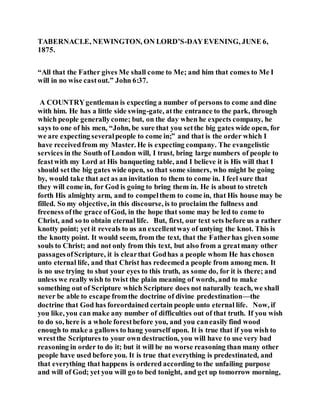
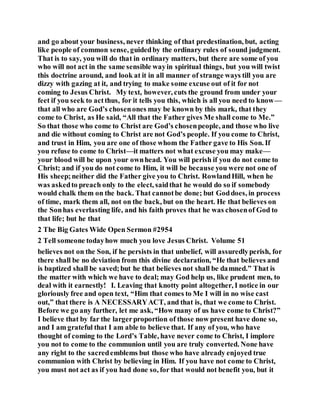
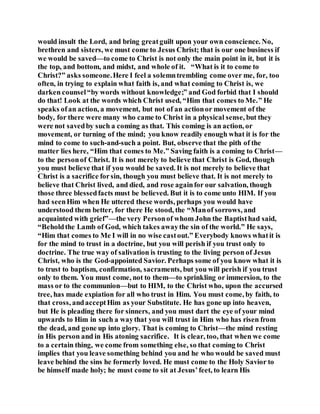
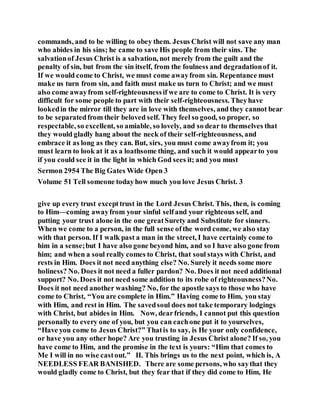
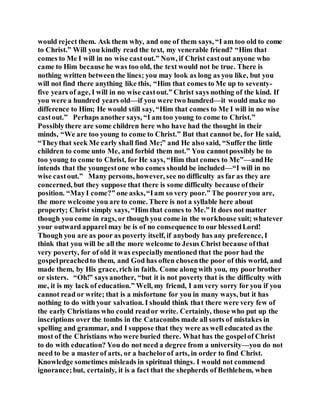
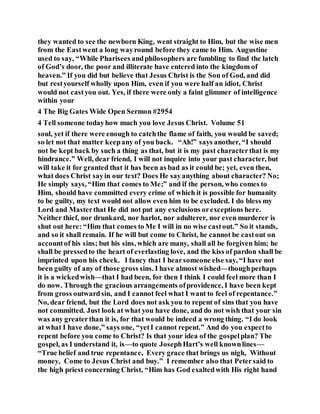
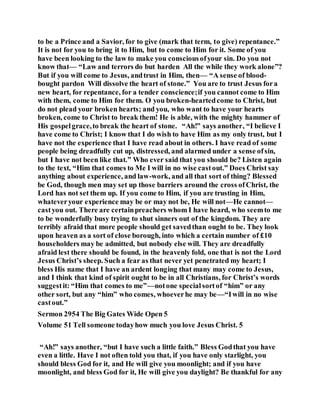
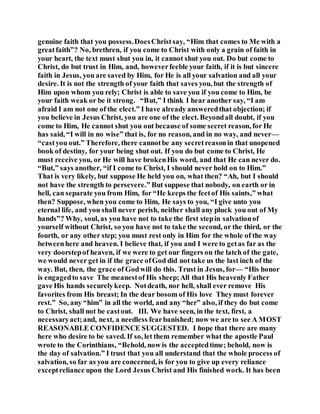
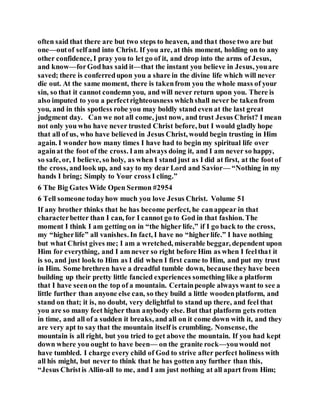
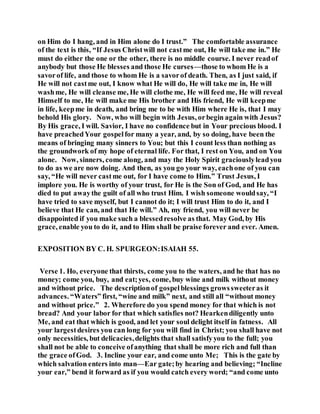
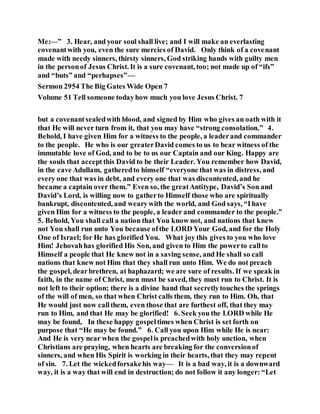
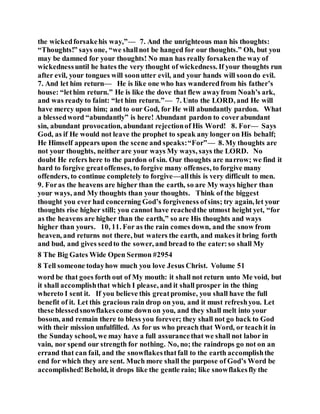
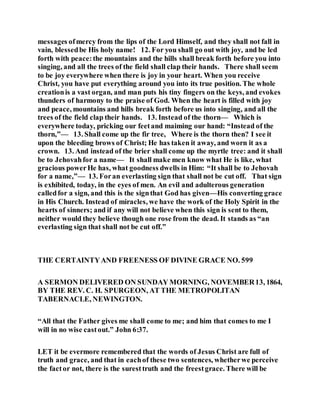
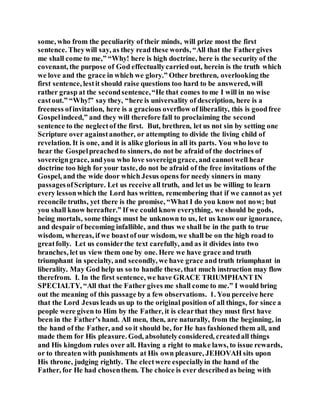
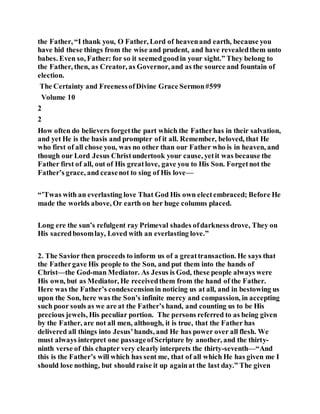
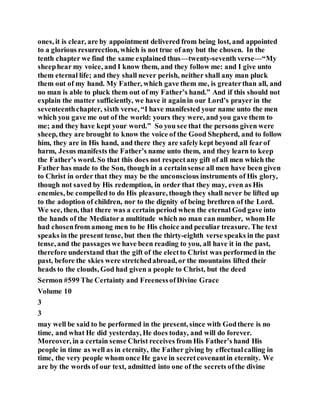
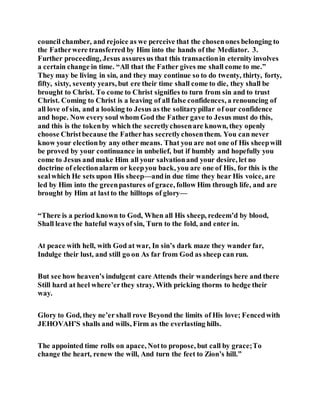
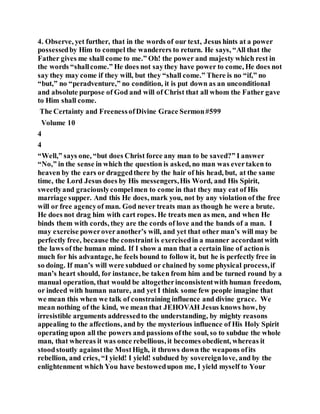
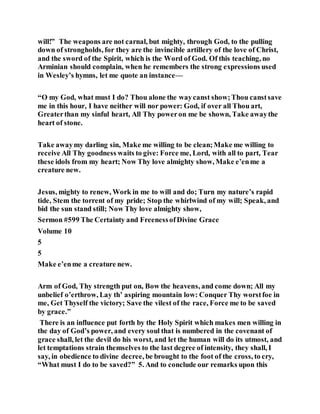
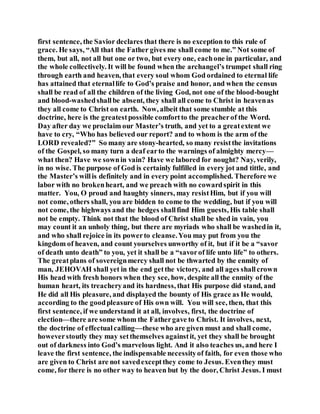
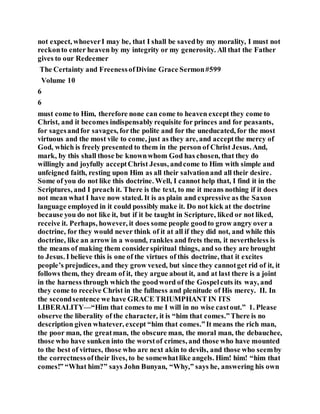
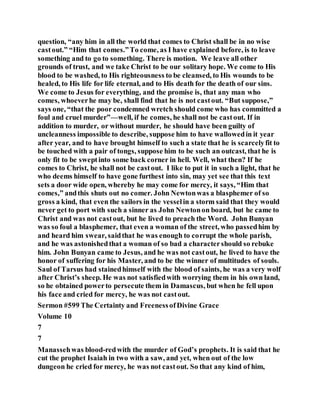
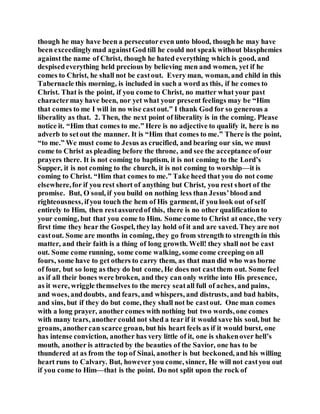
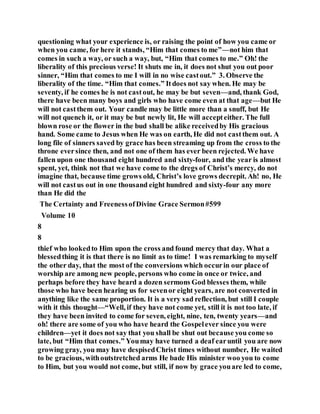

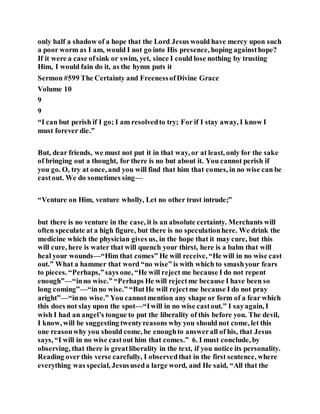
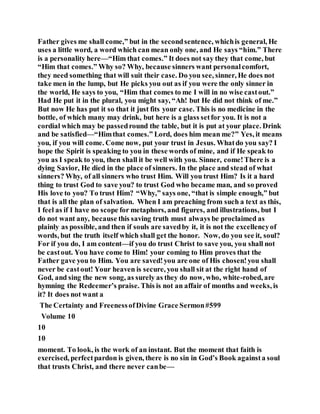
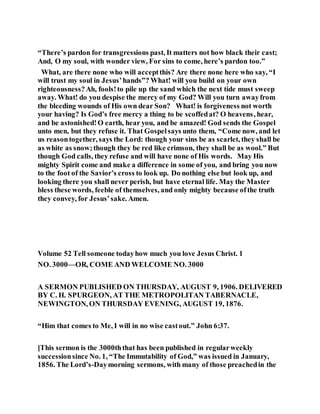
![evening, were published during Mr. Spurgeon’s lifetime. The rest of the
evening sermons are now being issued, and there are still sufficient
unpublished manuscripts to lastfor some years. The whole of the 3000
sermons are kept in stock, andany quantity of any of them canbe obtained of
the publishers, Messrs. Passmore & Alabaster, PaternosterBuildings,
London, EC. No. 3000 has been especiallyselectedin harmony with Mr.
Spurgeon’s custom of issuing, on such memorable occasions, a striking and
simple sermonthat might be even more widely distributed than the ordinary
issues. Those previouslypublished have been as follows:Volume 17,
NUMBER ONE THOUSAND—OR, “BREAD ENOUGHAND TO SPARE”;
Volume 25, NUMBER 1500—OR,“LIFTING UP THE BRONZE
SERPENT”;Volume 33, NUMBER 2000—OR, “HEALING BY THE
STRIPES OF JESUS”;Volume 43, NUMBER 2500—OR, “ENTRANCE
AND EXCLUSION.” The publishers are always pleasedto quote special
terms for quantities, and to send post free to all applicants their Textual Index
of over 2900 sermons, and a full List of C. H. Spurgeon’s books at reduced
prices. It is almost needless to say that in the whole history of religious
literature, there has never before been such an event as the issue of 3000 of
one Preacher’s sermons in weeklynumbers for nearly 52 years!It is a
remarkable fact that more than 750 of these sermons have been published
since Dr. Spurgeon was “calledhome” on January 31, 1892. Will all believing
readers pray for the Lord’s blessing upon the whole of the 3000 sermons now
issued?] [Thought you might enjoy this quote of the original publishers—
EOD]
WHILE I was trying to prepare a sermon for this evening, someone calledat
my door—I daresaythe friend is here tonight, (I hope so)—andleft this little
note—“Ientreat you to pray, especiallythis evening, for a most unhappy
case—forone who is in greatagony of mind, that God, in His infinite mercy,
would send one ray of light into the dark soul. Please askallthe converted
ones in your congregationto pray for me, that grace may be restoredto a
most unhappy soul.” Well, I am sure that all Christians here will earnestly
pray that the light may break into the thick darkness, and that the troubled
spirit may find rest, but, after all, there is a very strong temptation to a heart
in trouble to rest in the prayers of others rather than to go immediately to
Christ for relief. Yet all the prayers in the world cannot, by themselves, help a
man who is in despair. The light can never come into that dungeon except
through one window—andthat is a window through which the tearful eyes
may always look—the window of everlasting love as revealedin the atoning](https://image.slidesharecdn.com/jesuswasawelcomer-200320144616/85/Jesus-was-a-welcomer-199-320.jpg)
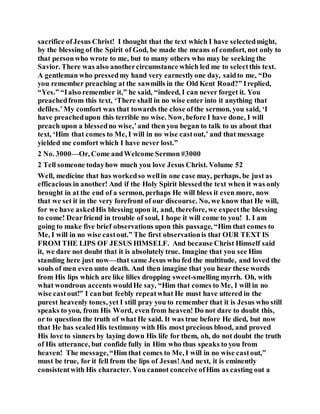
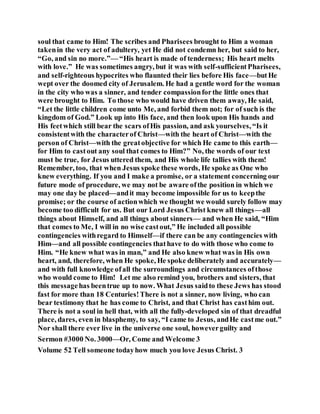
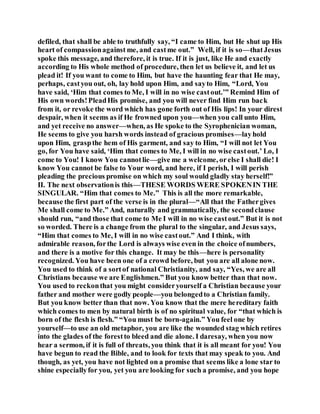
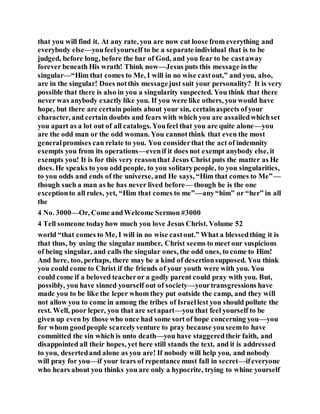
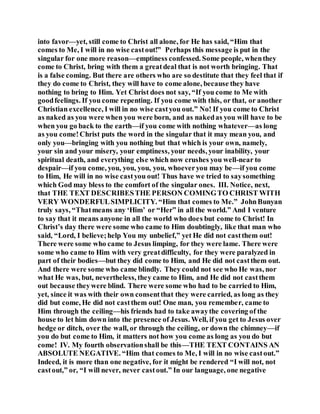
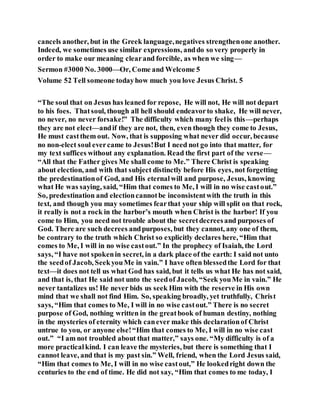
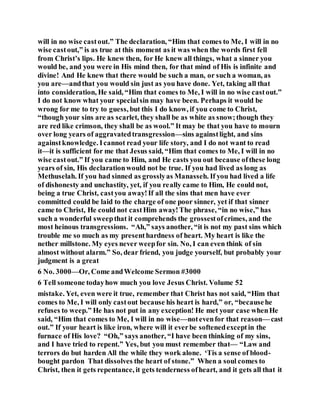
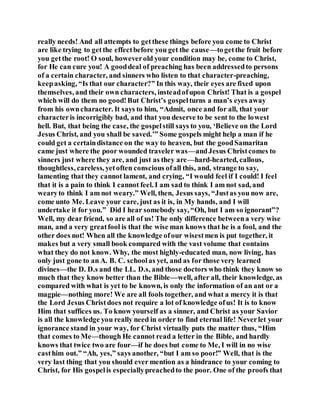
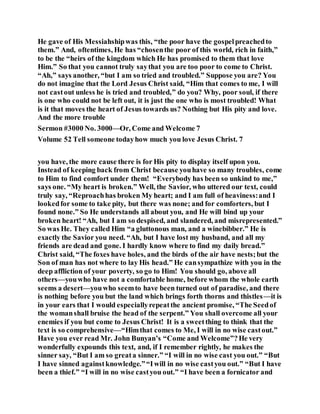
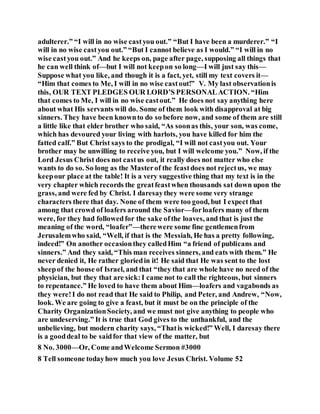
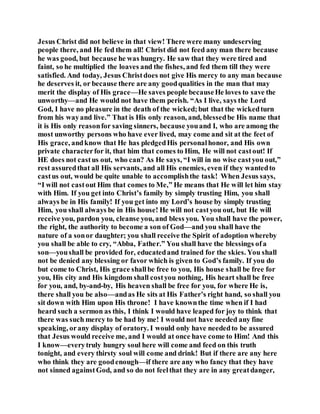
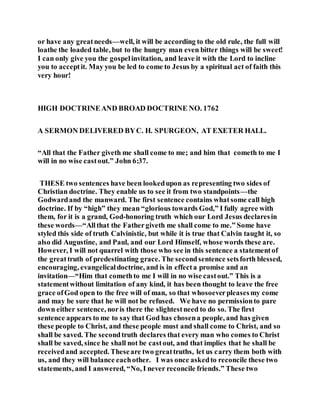
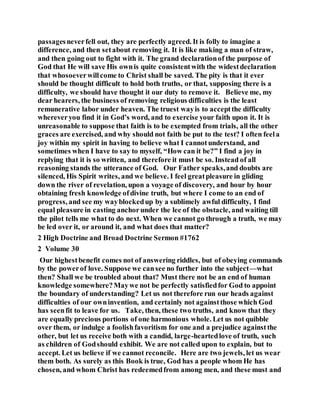
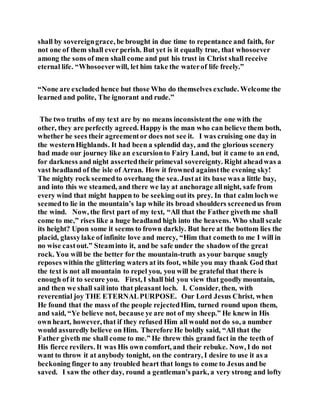
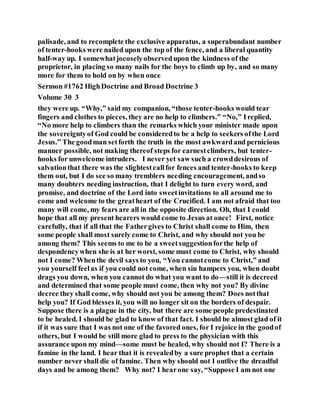
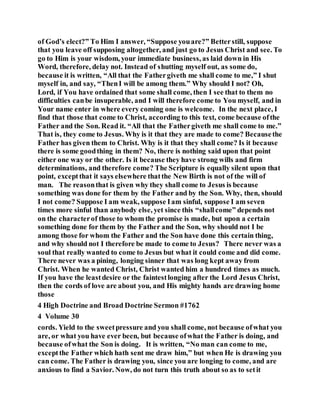
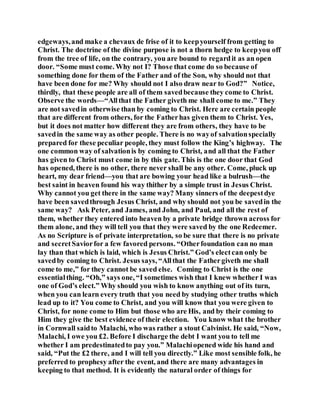
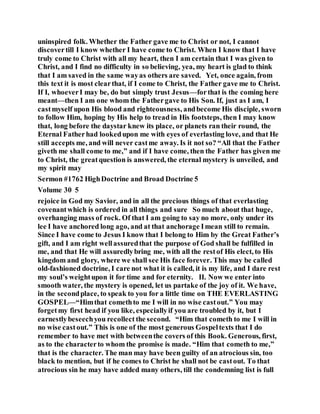
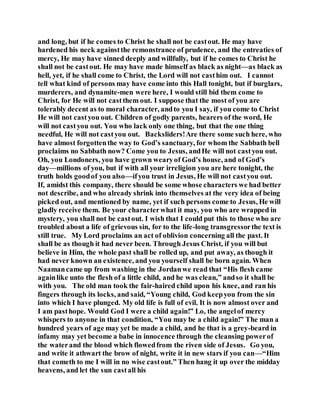
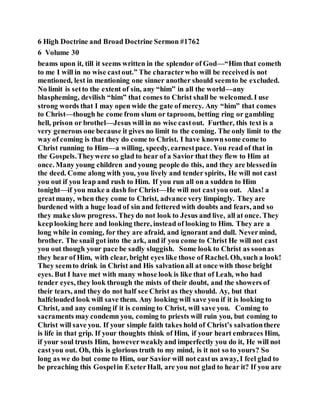
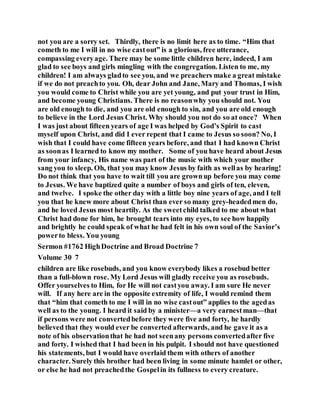

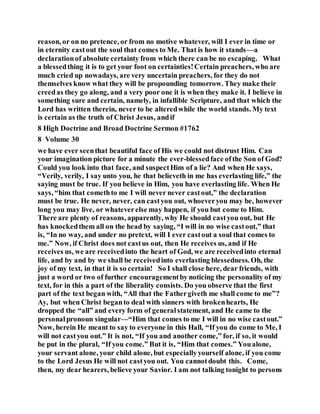
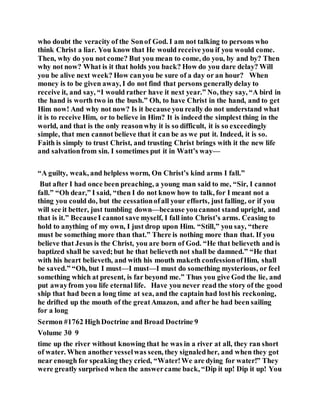

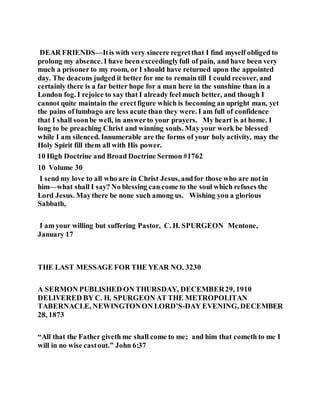
![[Mr. Spurgeon preachedmany sermons upon this verse, among those already
published are #1762,High Doctrine and Broad Doctrine, #2349, All Comers to
Christ Welcomed, #2954,The Big Gates Wide Open, and #3000, No. 3000—
Or Come and Welcome.]
WE have come to the lastSabbath evening, and the last public Sabbath
service of another year, with some of us it may be our last Sabbath on earth,
and our last public Sabbath service in this life. It becomes us then to fix our
thoughts upon solemn and weighty themes, those which are of the utmost
importance to us, and those which most closelyconcernour eternaldestiny. I
pray that the Holy Spirit may cause the deepestpossible seriousness to rest
upon this whole assembly, and that He may very speciallyguide me to speak
as I ought upon the familiar but most weighty words that I trust He has
moved me to selectonce againfor your very earnest considerationtonight. I
have preachedmany times upon this text, but on this occasion, I am going to
speak briefly upon three topics that it suggests to me. The first is that there is
only one wayof salvation, “All that the Fathergiveth me shall come to me.”
“Him that cometh to me.” This topic will teach us the exclusiveness ofdivine
grace. Secondly, this waywill be used by some, “All that the Father giveth me
shall come to me.” This teaches us the omnipotence of divine grace. Thirdly,
all who come by this wayshall be saved, “him that comethto me I will in no
wise castout.” This teaches us the fullness and freeness ofdivine grace. I.
First, then, we learn from our text THE EXCLUSIVENESS OF DIVINE
GRACE, THERE IS ONLY ONE WAY OF SALVATION, “All that the
Father giveth me shall come to me.” “Him that comethto me.” To come to
Jesus is the one and only way of salvation. If there could have been any other
way, this one would never have been opened. It is not conceivable that God
would have given His only begottenand well-belovedSon to die upon the cross
of Calvary in order to save sinners if there had been any other wayof saving
them that would have been as consistentwith the principles of infallible
justice. If men could have entered into everlasting life without passing along
the path stainedand consecratedby the blood of Jesus, surelythat blood
would never have been “shedfor many for the remissionof sins.” The very
fact that this new and living way has been openedproves that there is no
other, for God would never have provided it unless it had been absolutely
necessary. Thatthis is the only wayof salvationis againand againemphasized
in Scripture with a sacredintolerance whichnone ought to mistake. Writing
to the Corinthians, under the inspiration of the Holy Spirit, Paul says, “Other
foundation can no man lay than that is laid, which is Jesus Christ,” and to](https://image.slidesharecdn.com/jesuswasawelcomer-200320144616/85/Jesus-was-a-welcomer-226-320.jpg)
